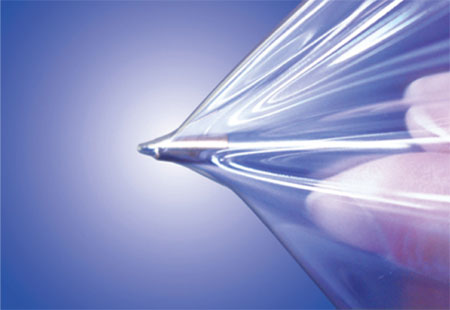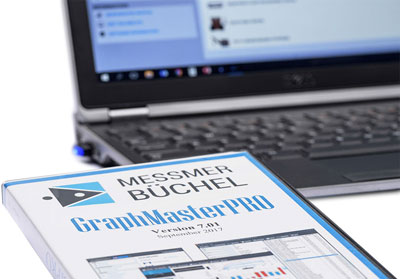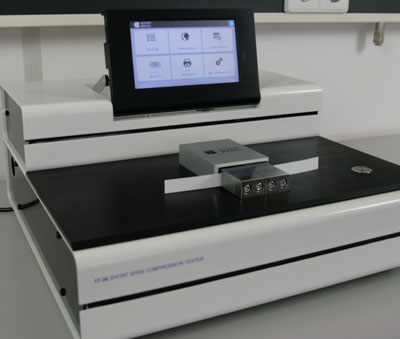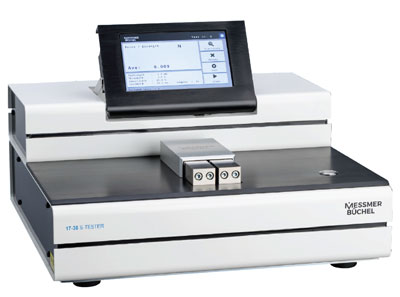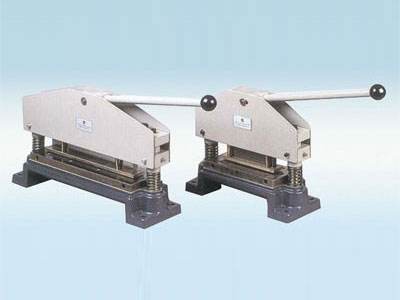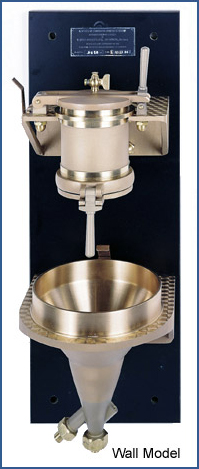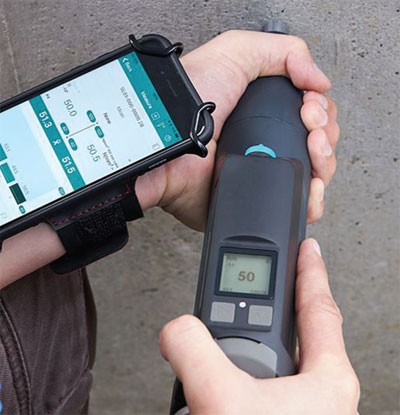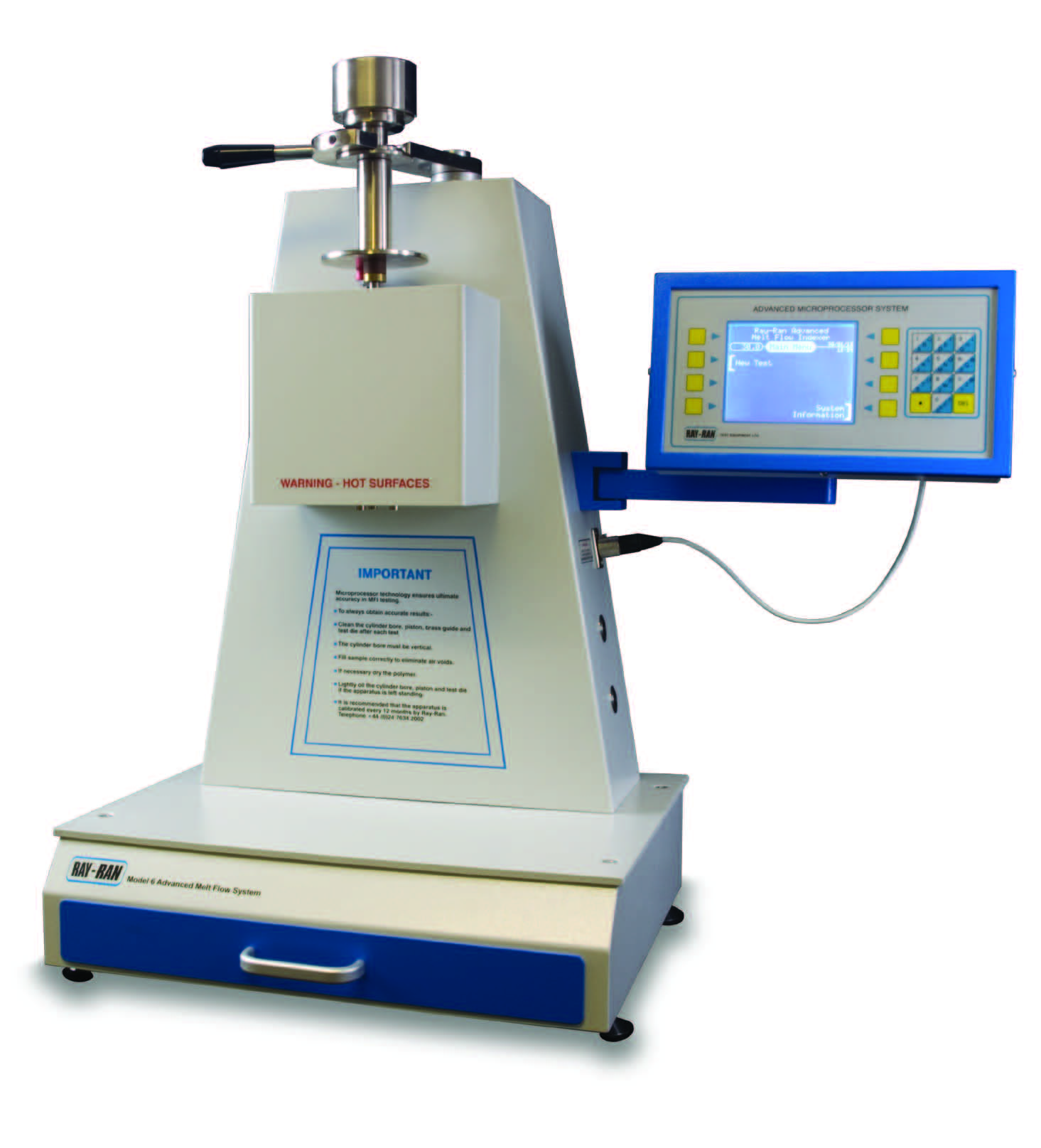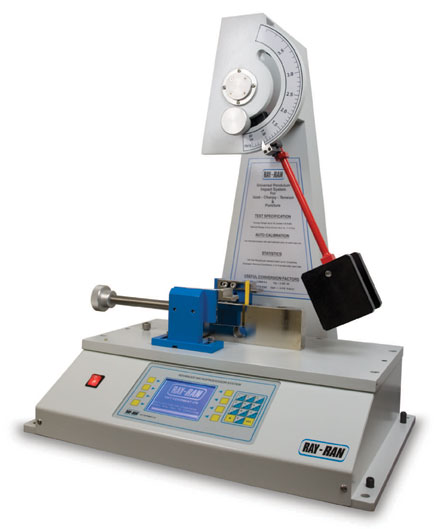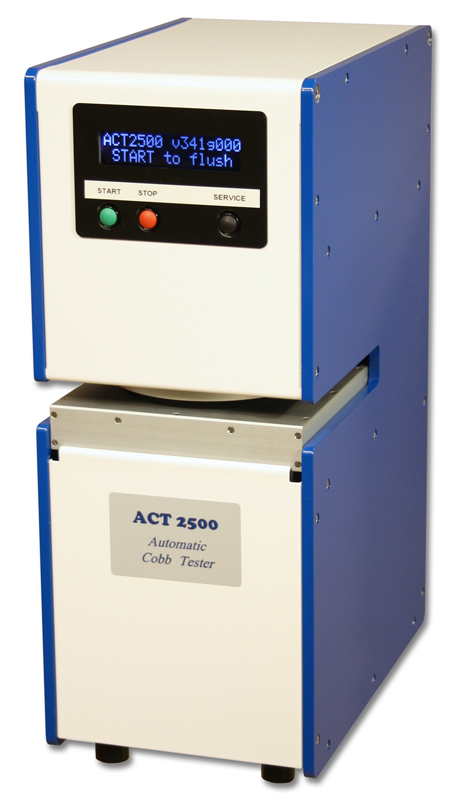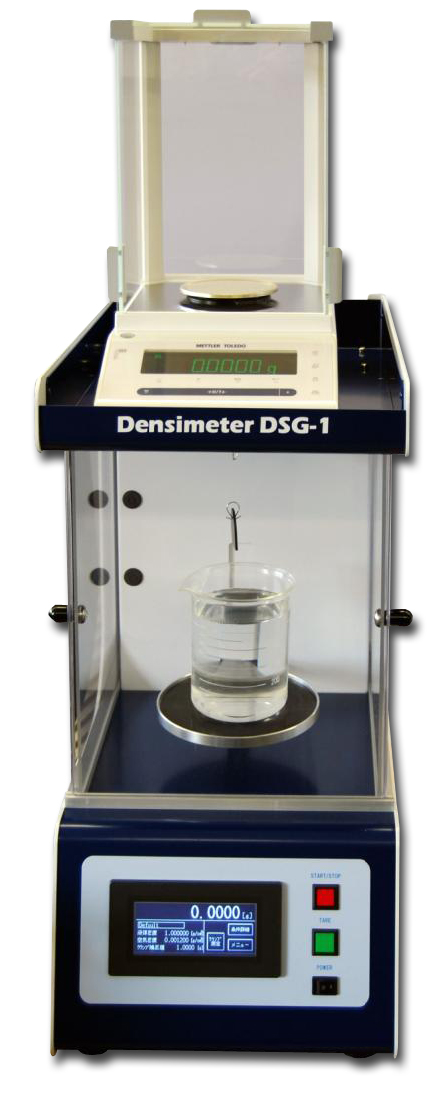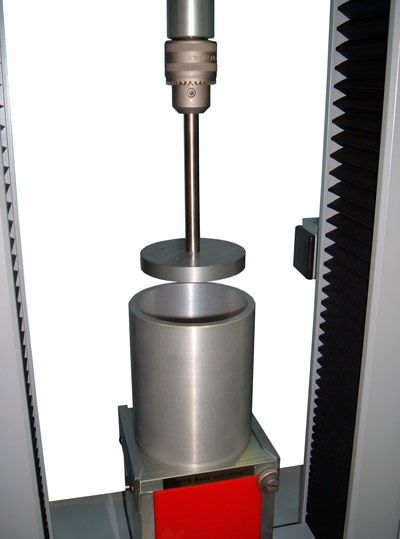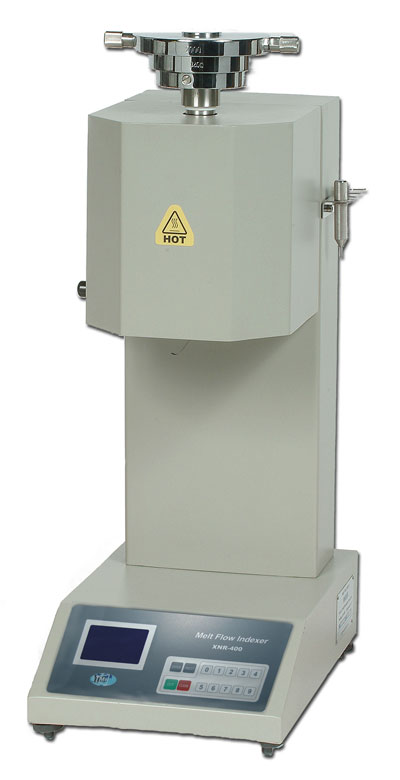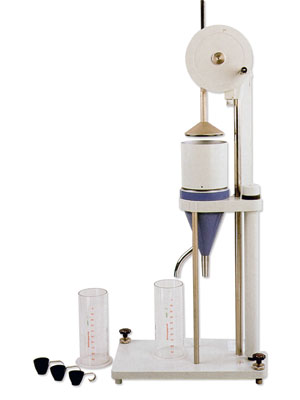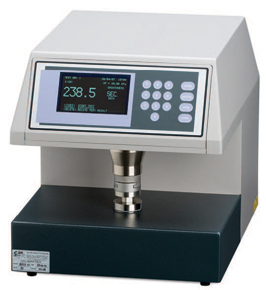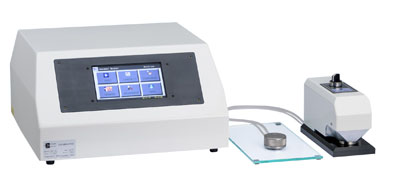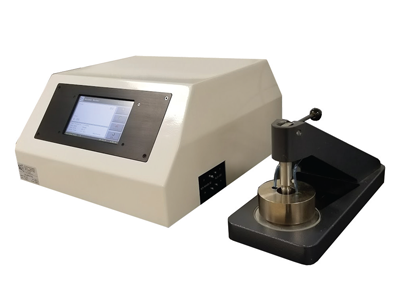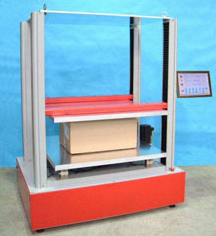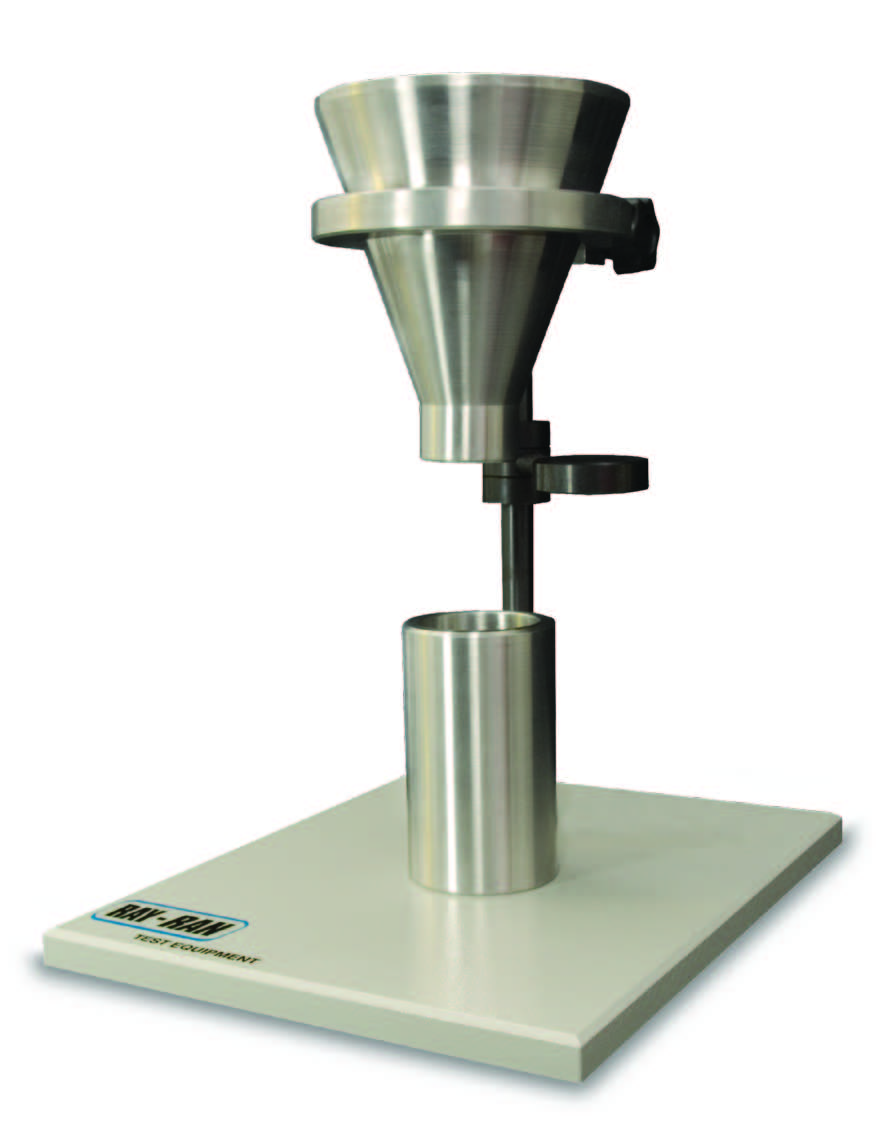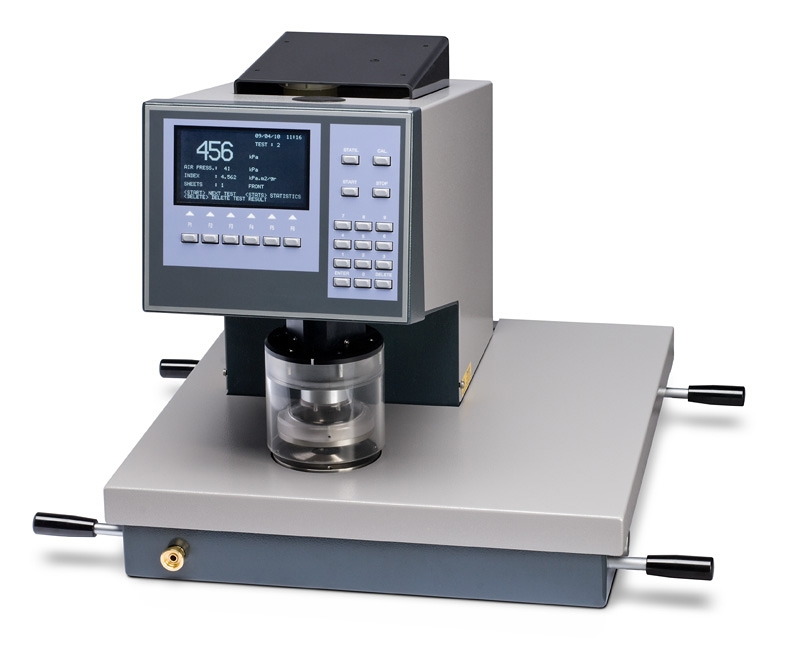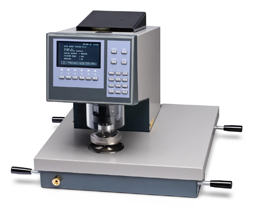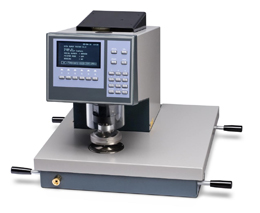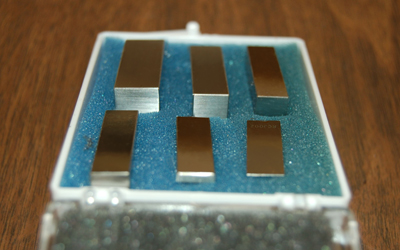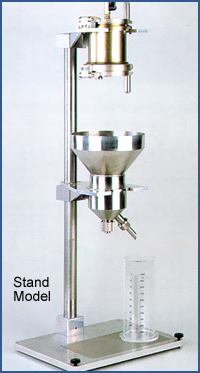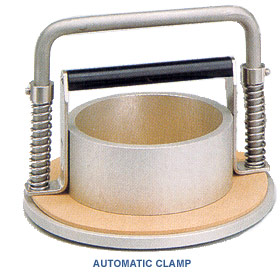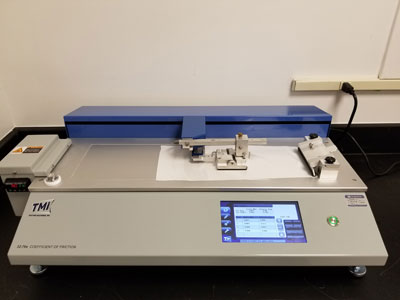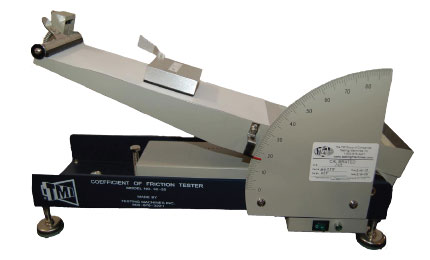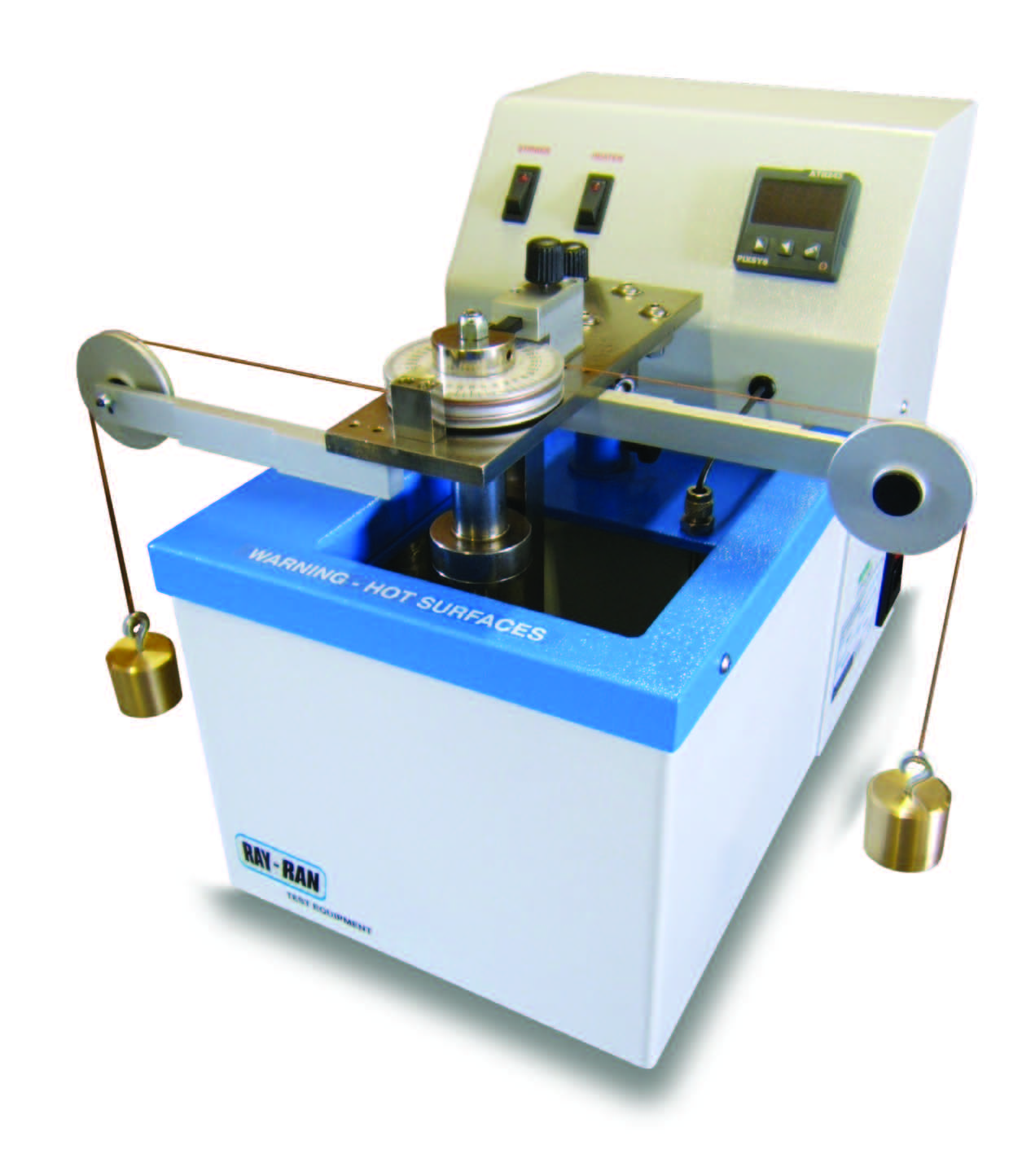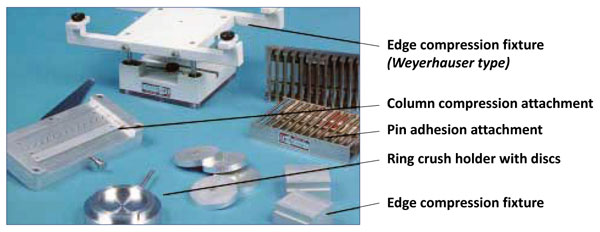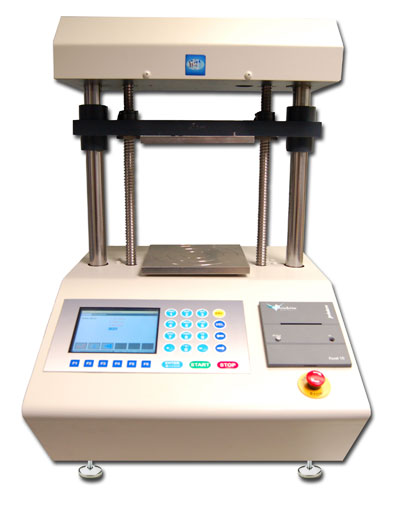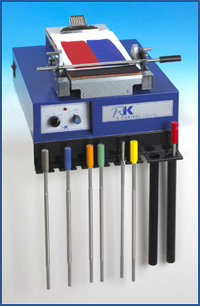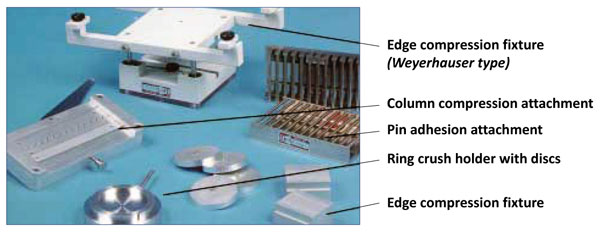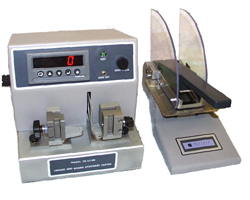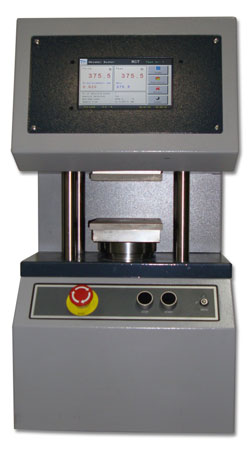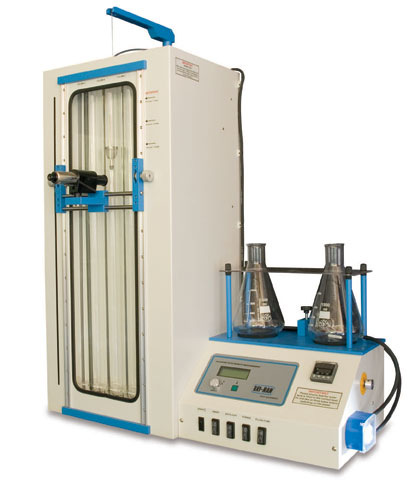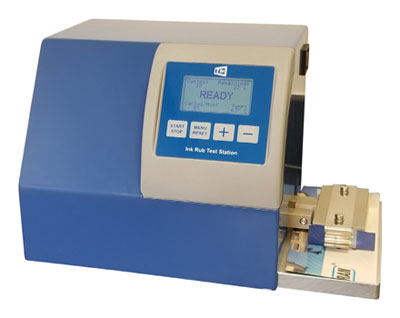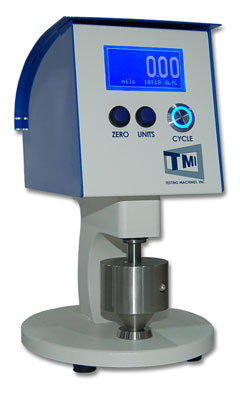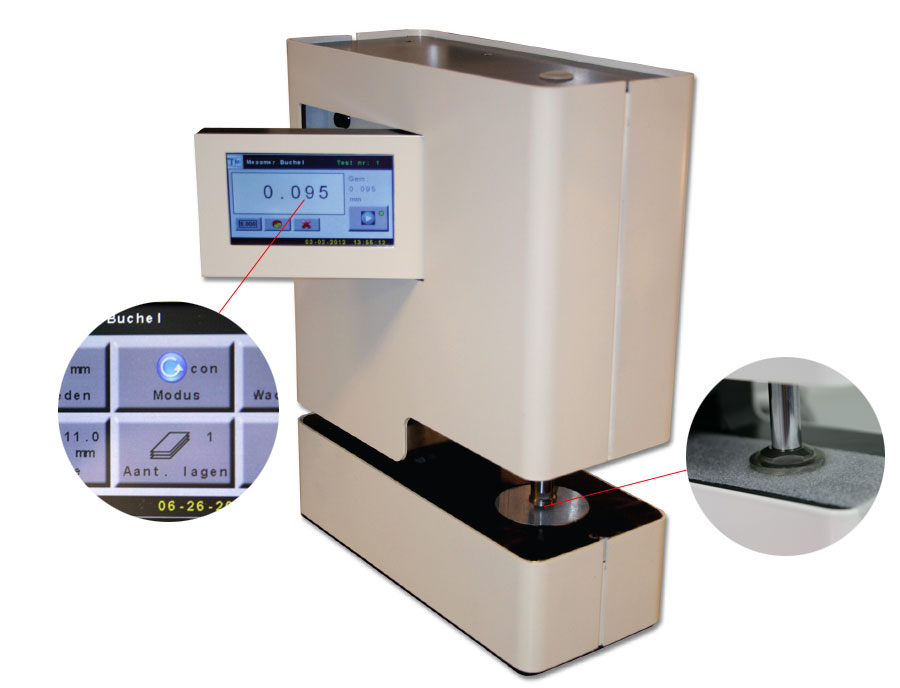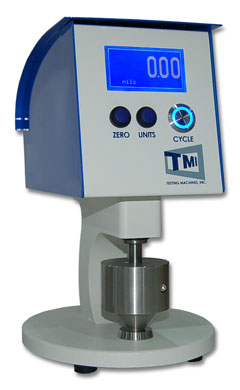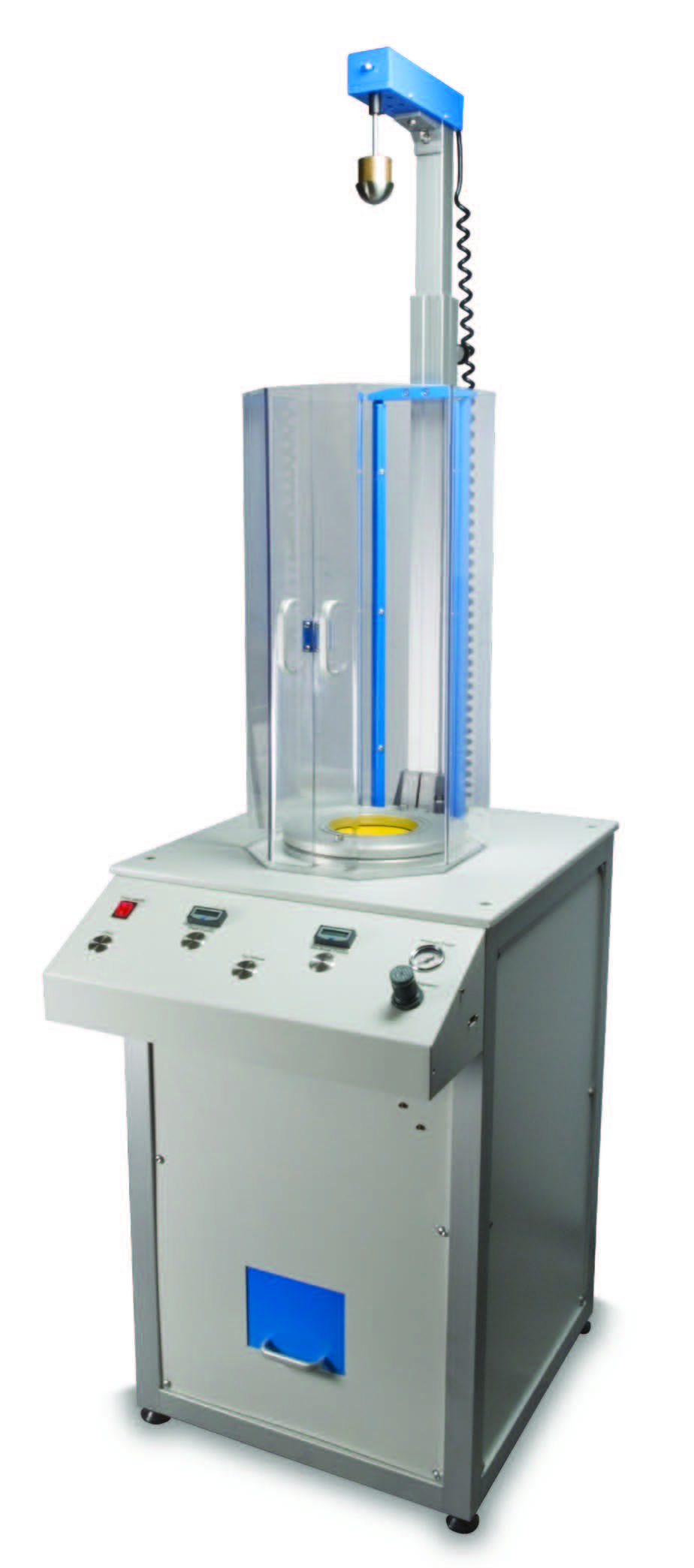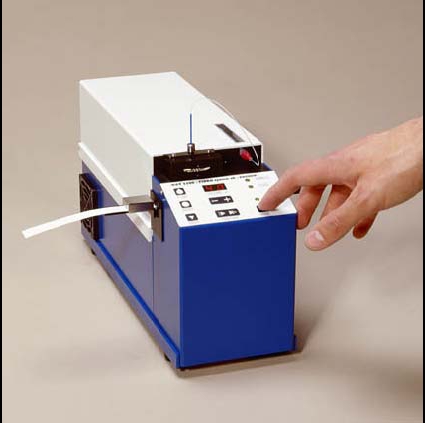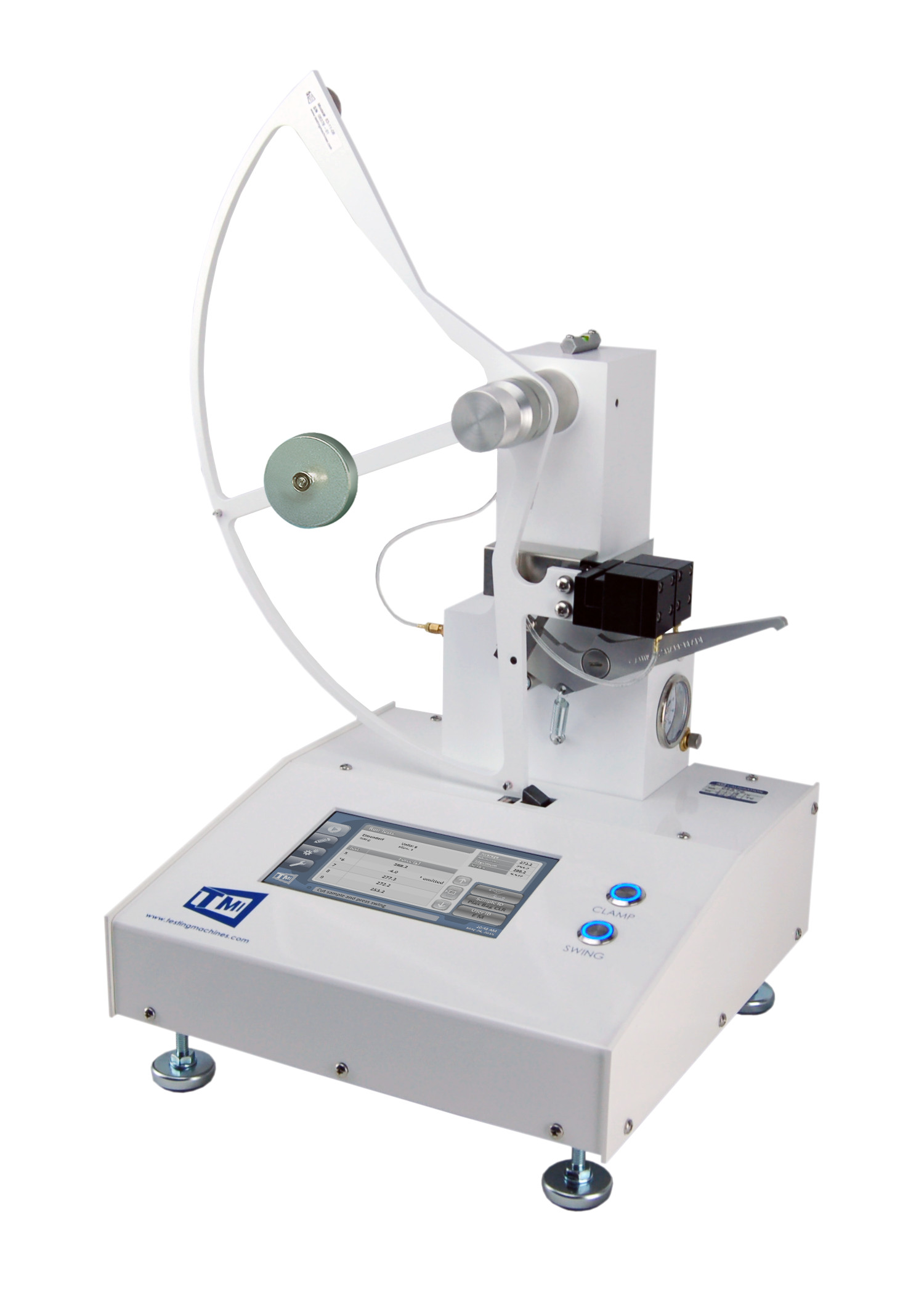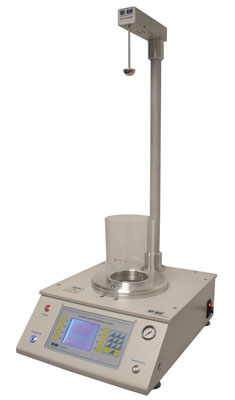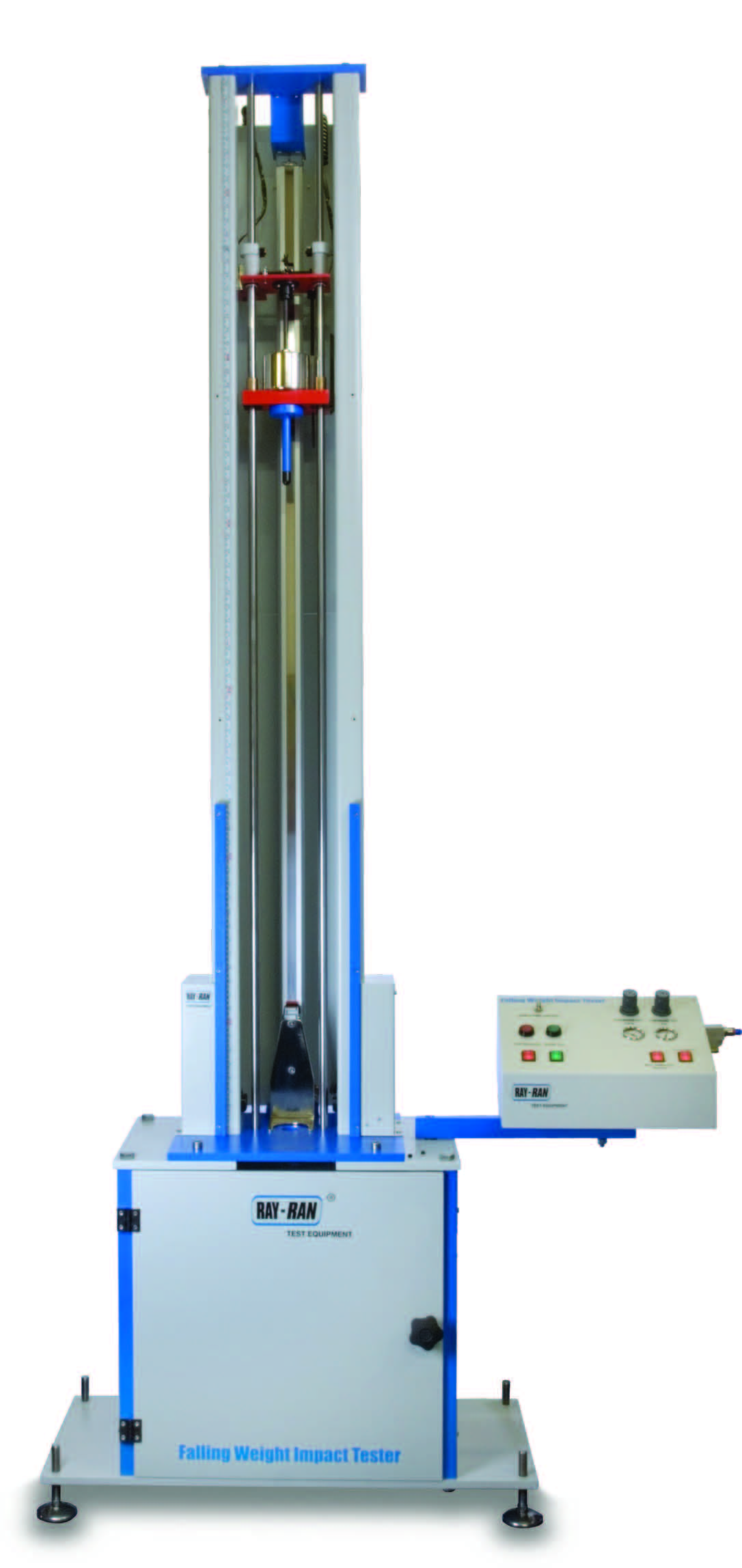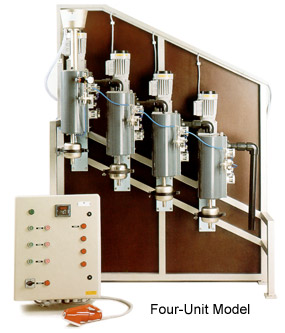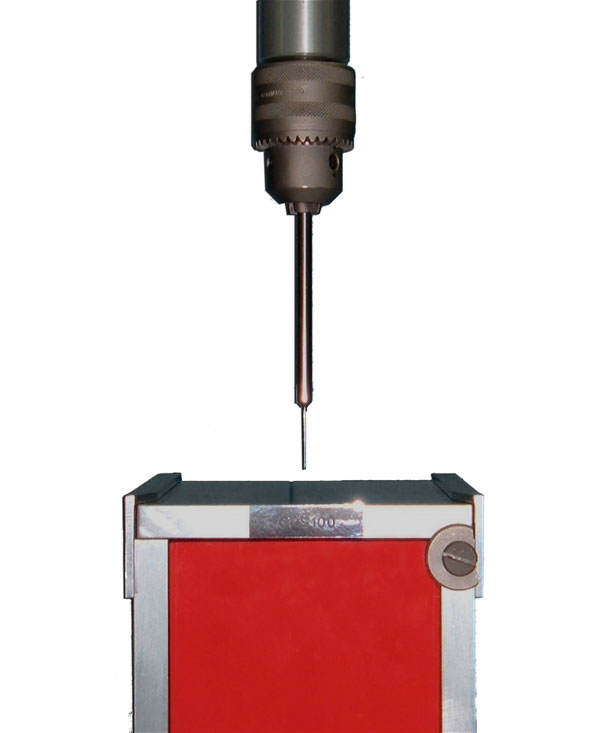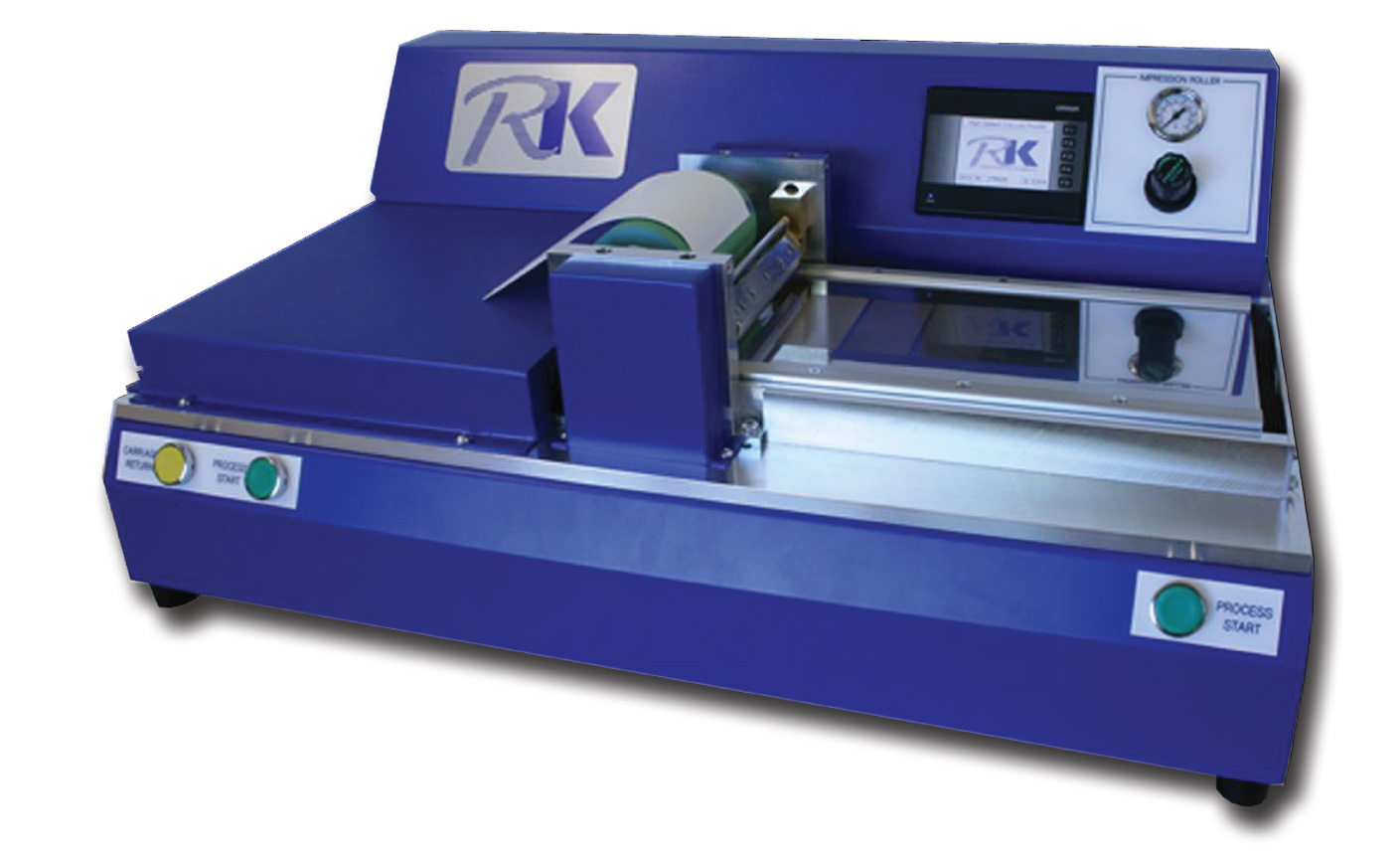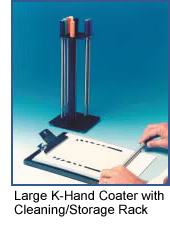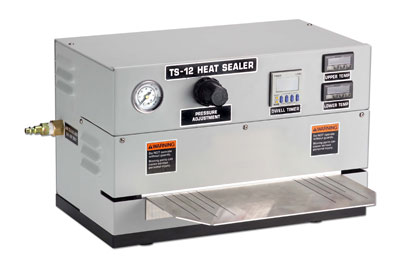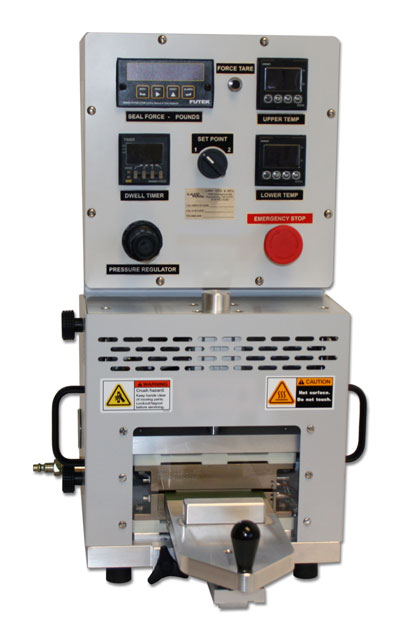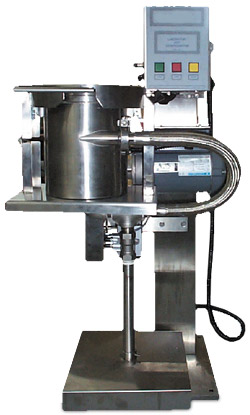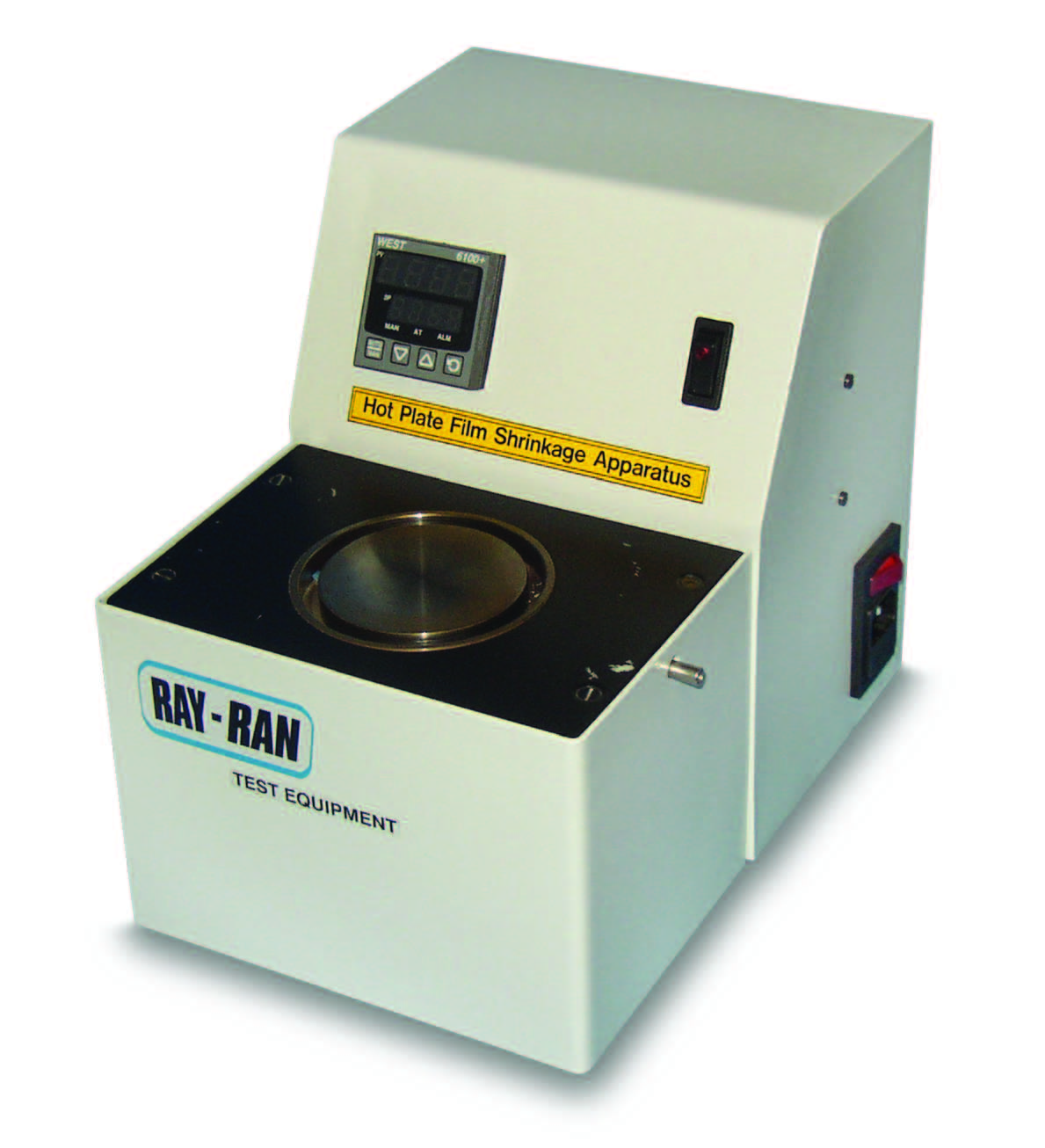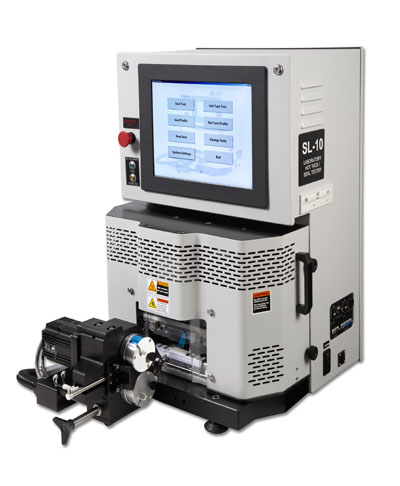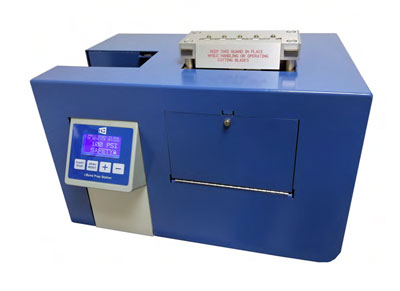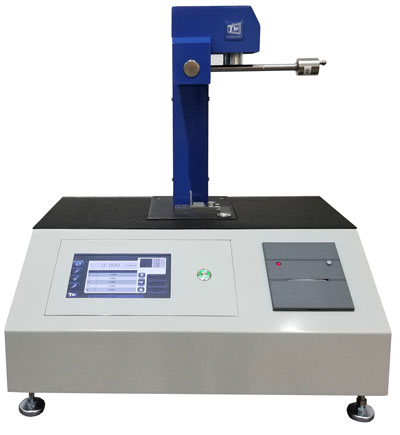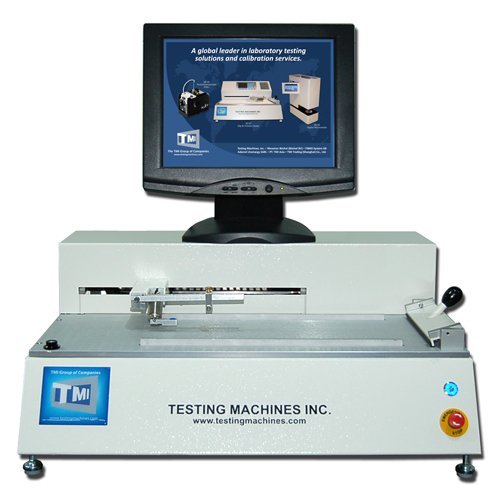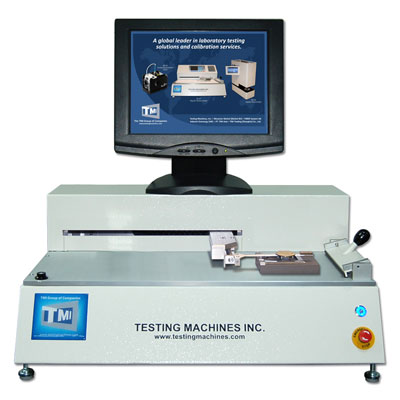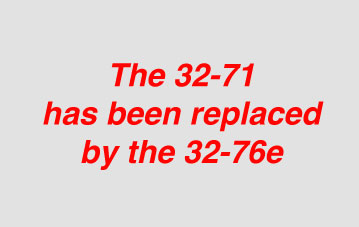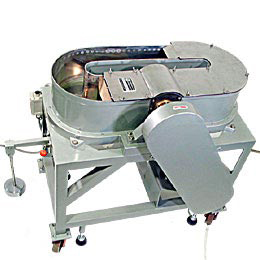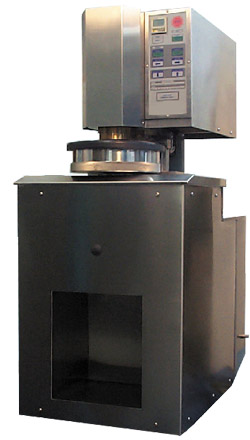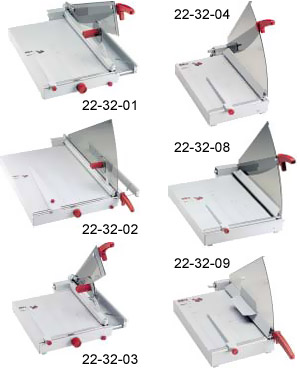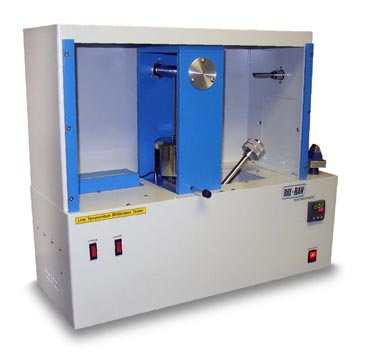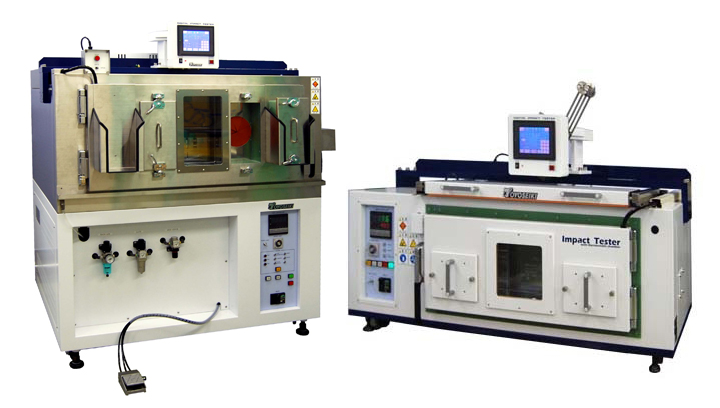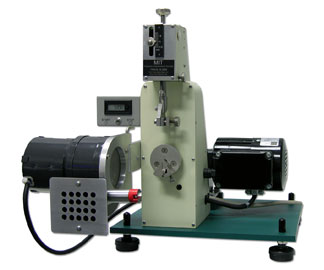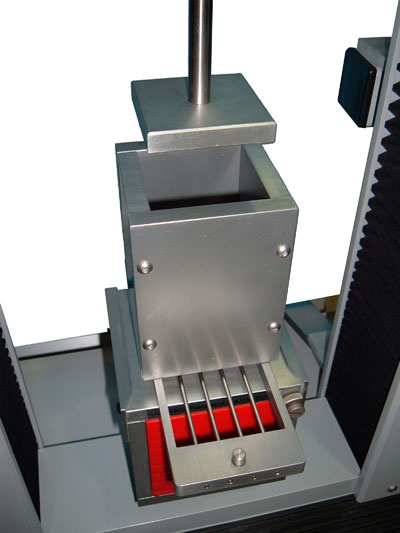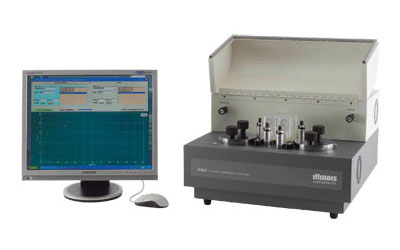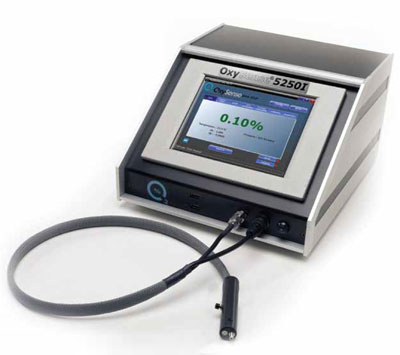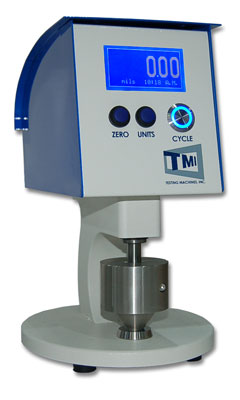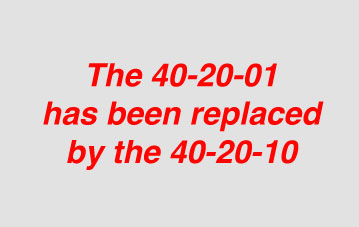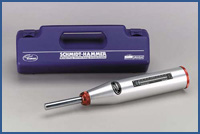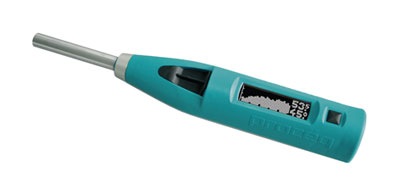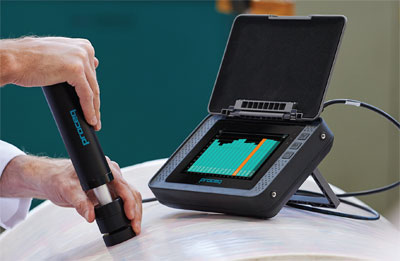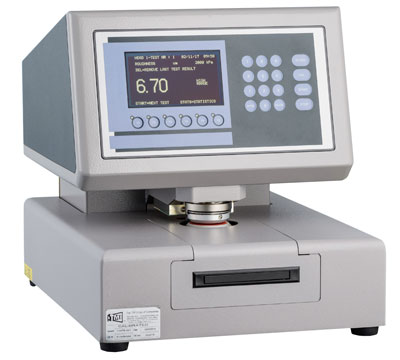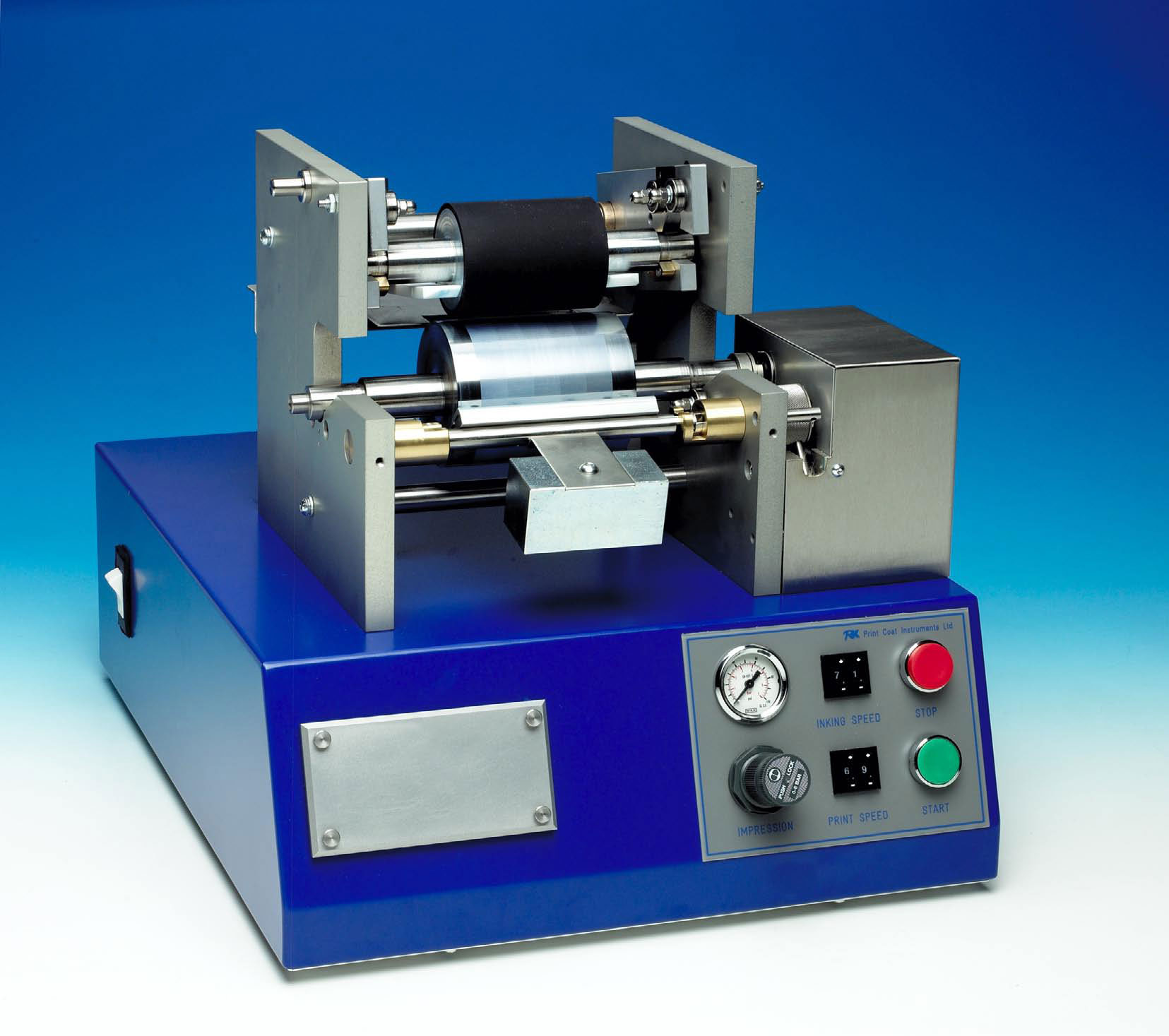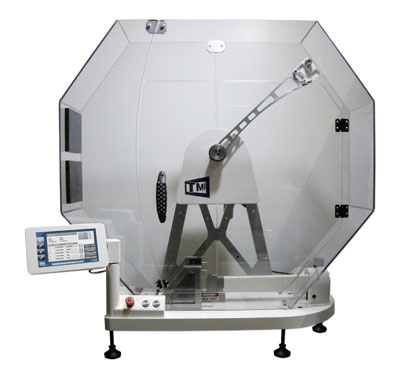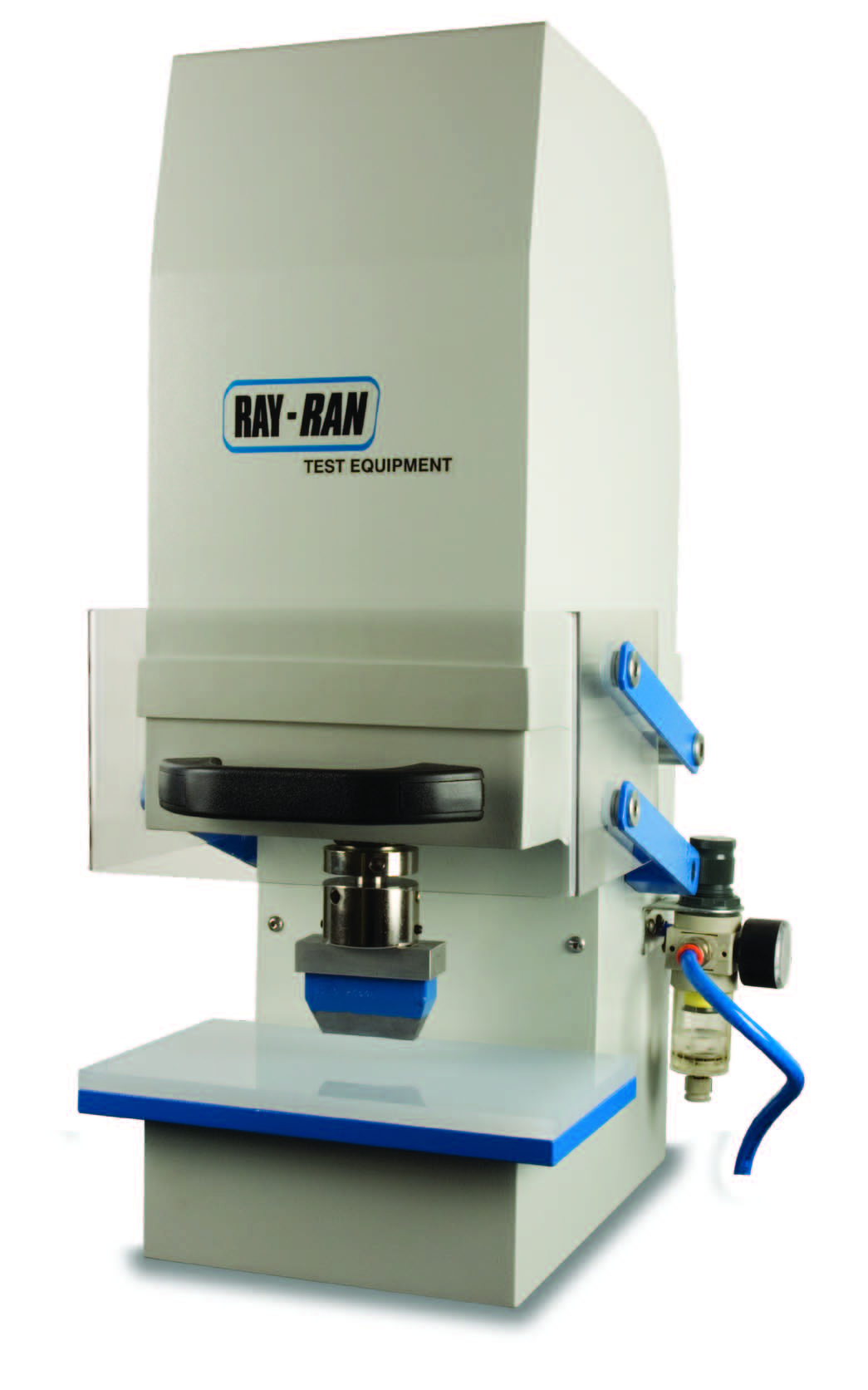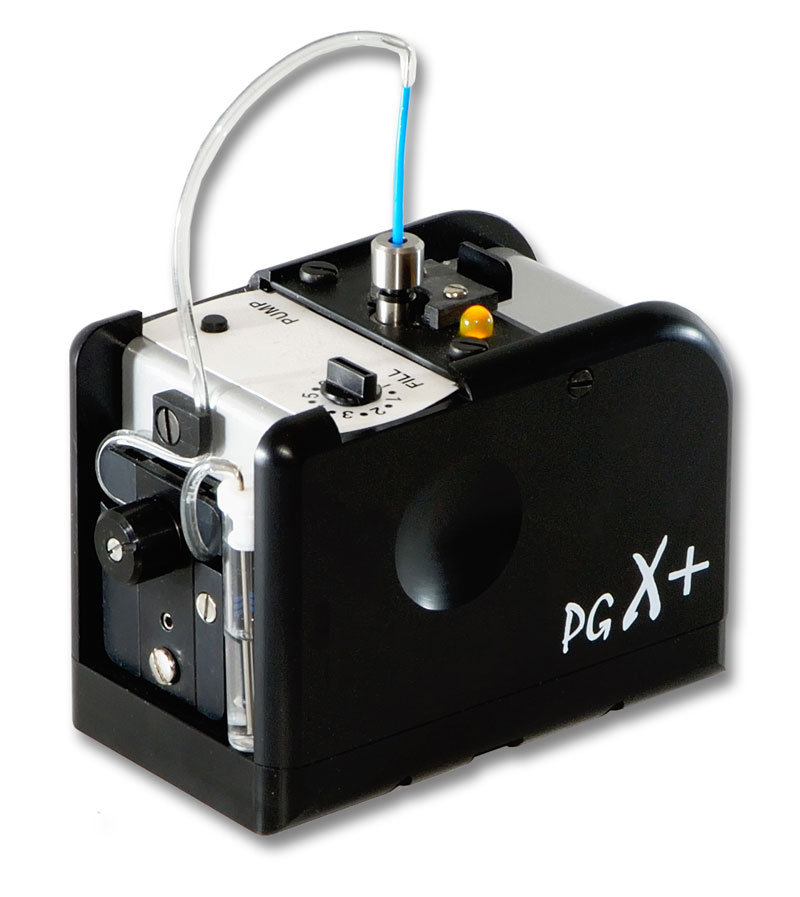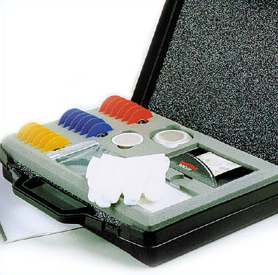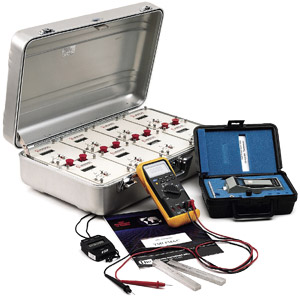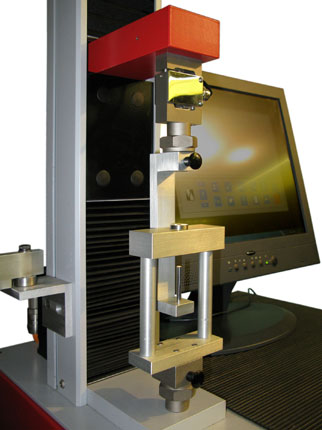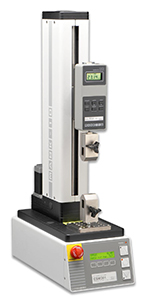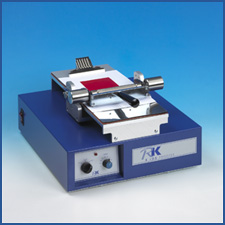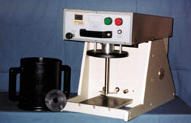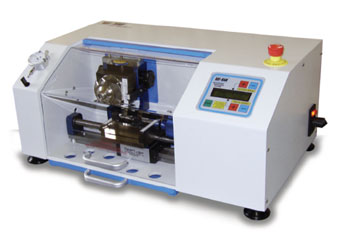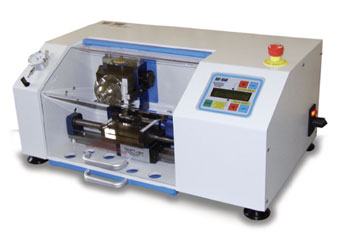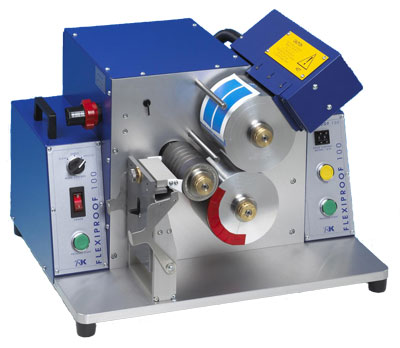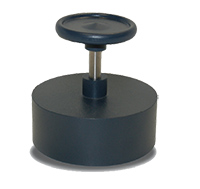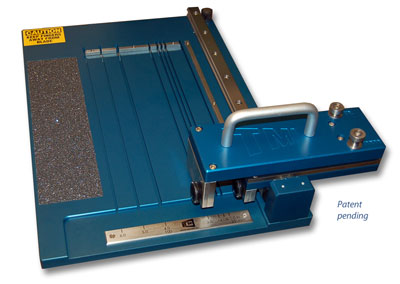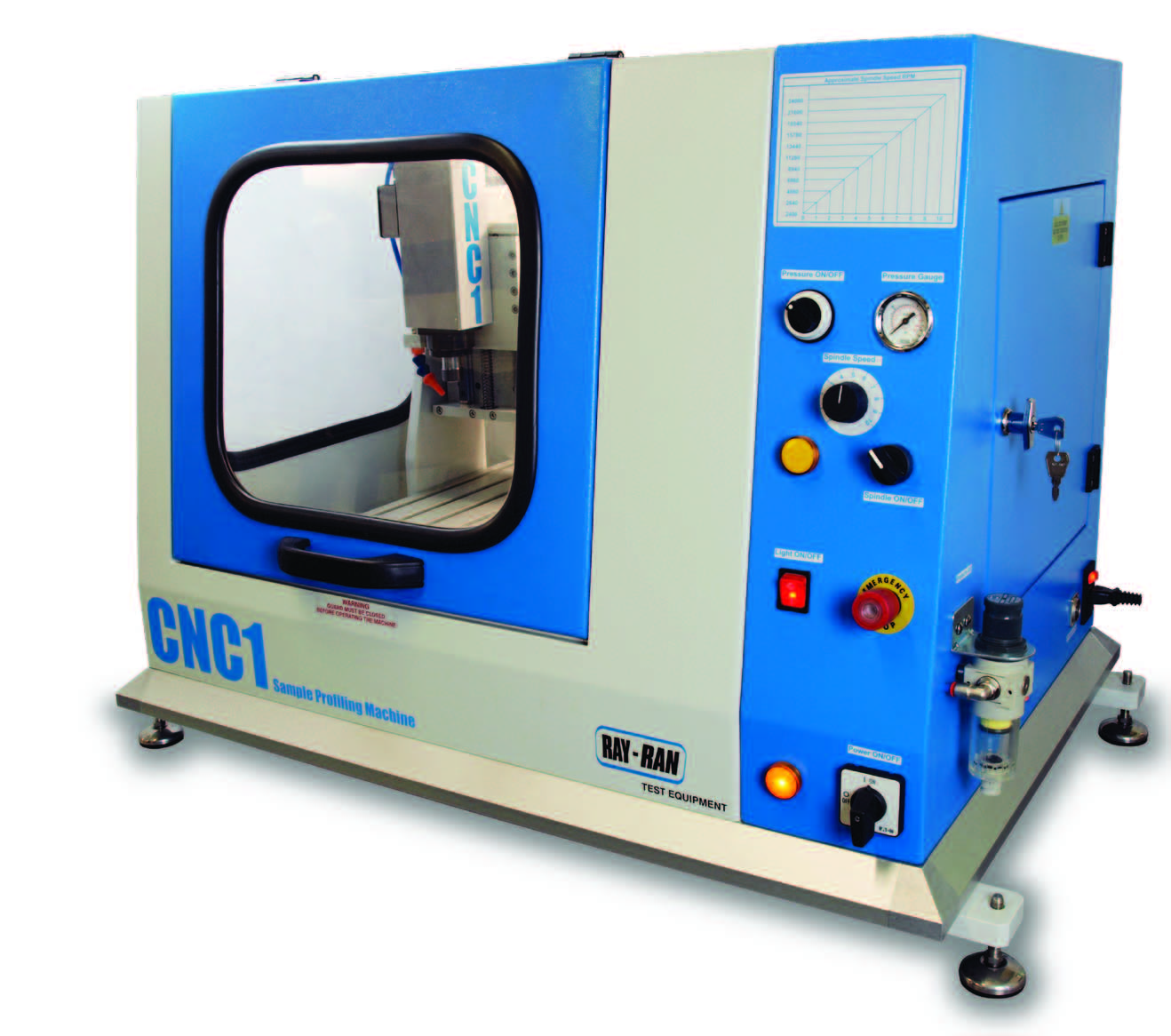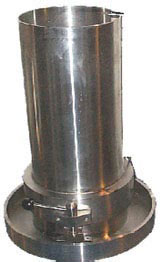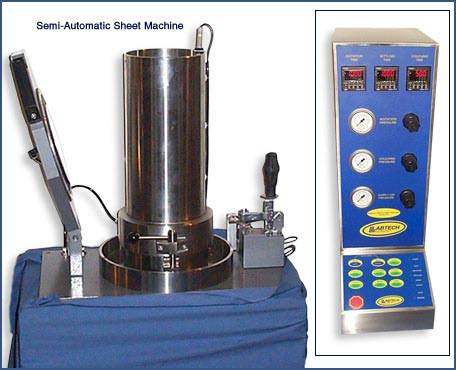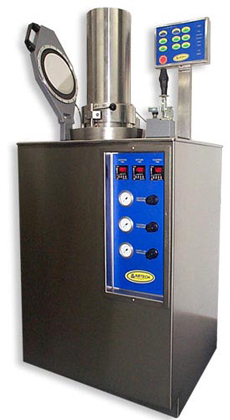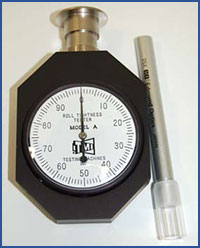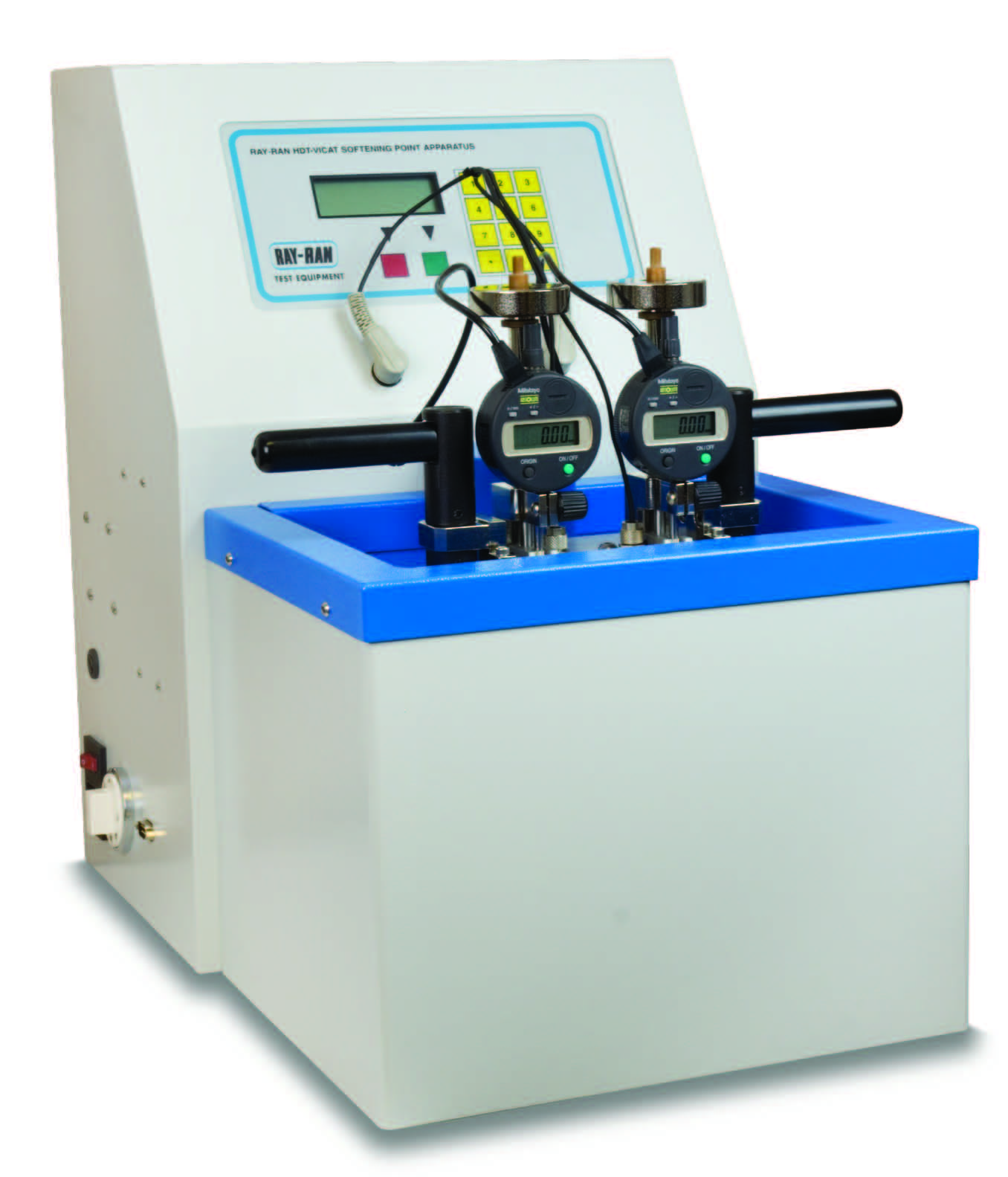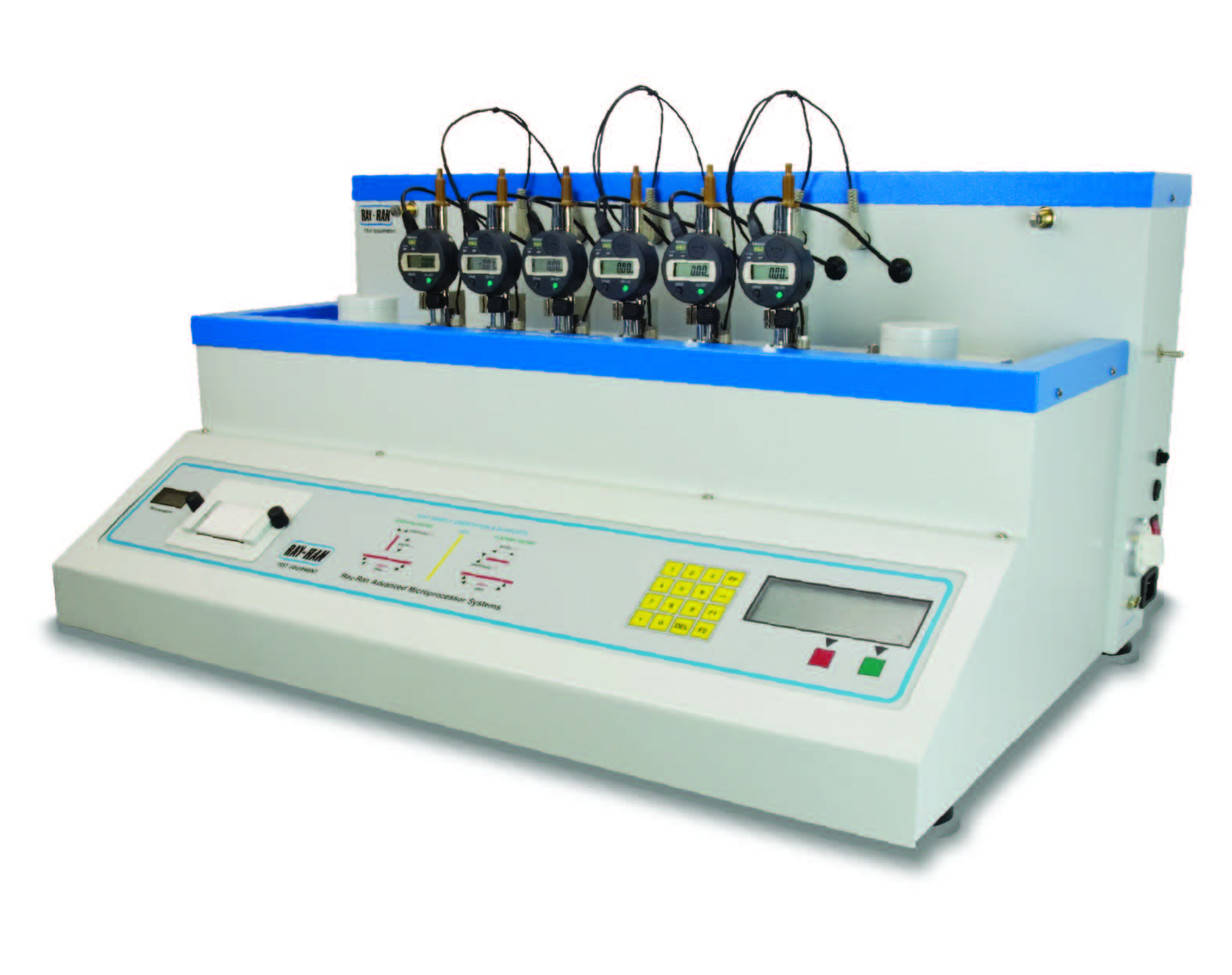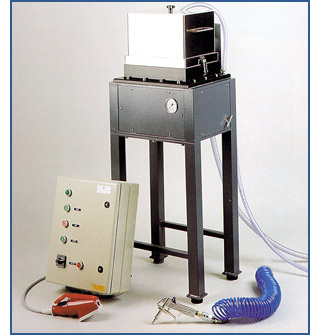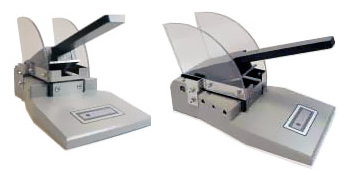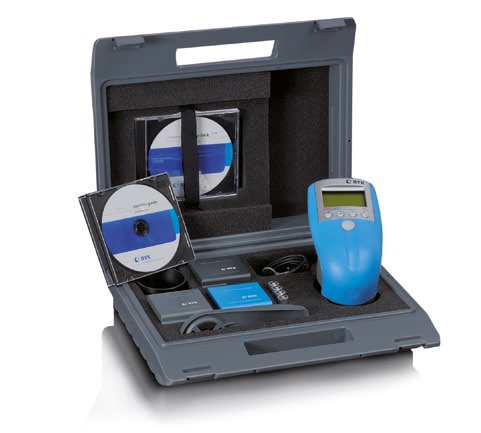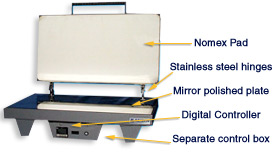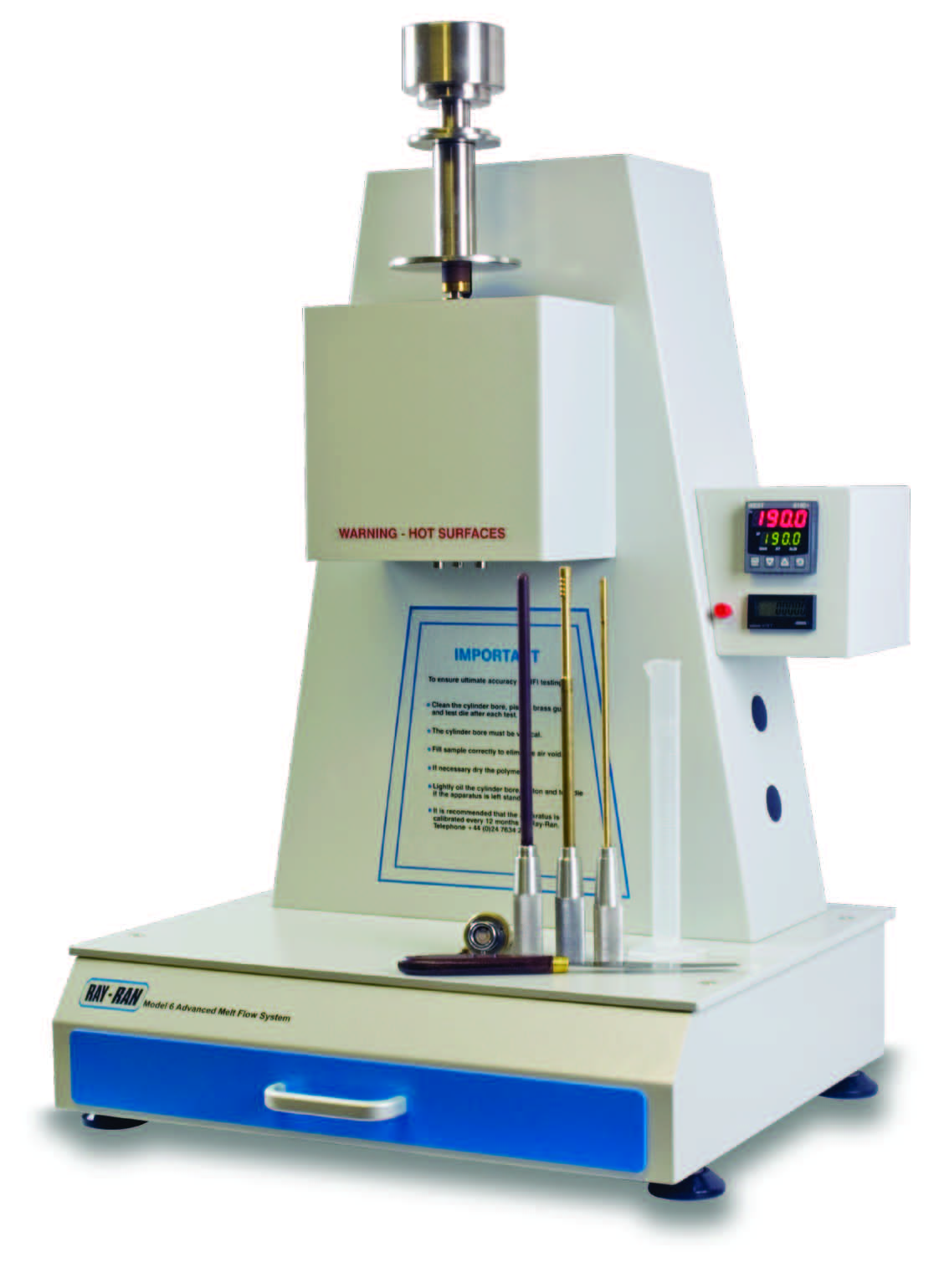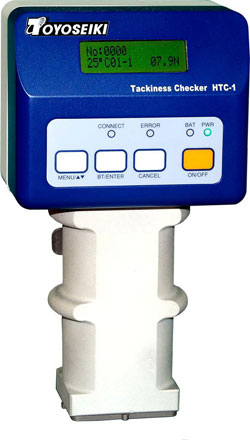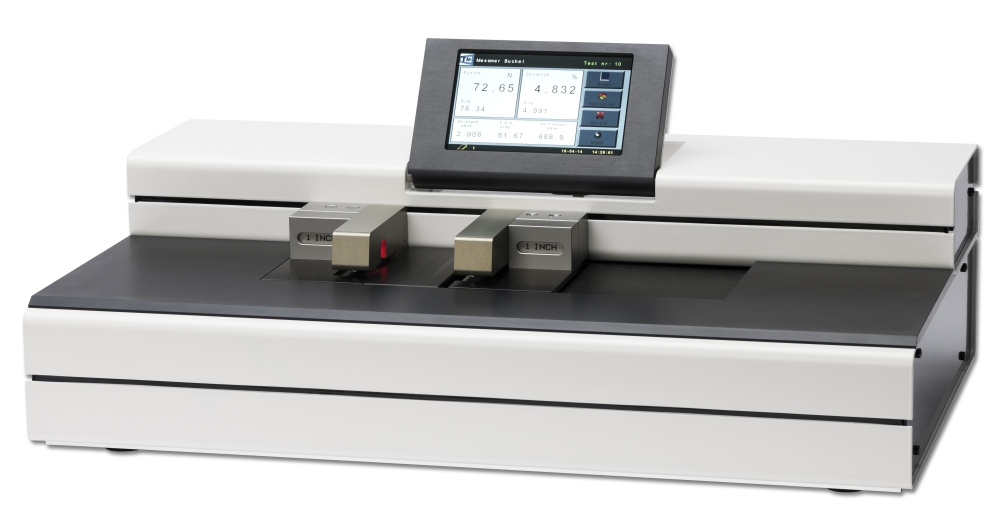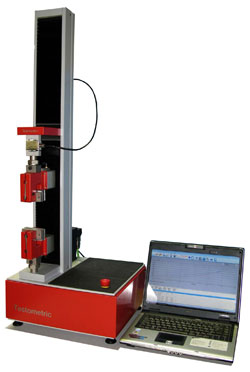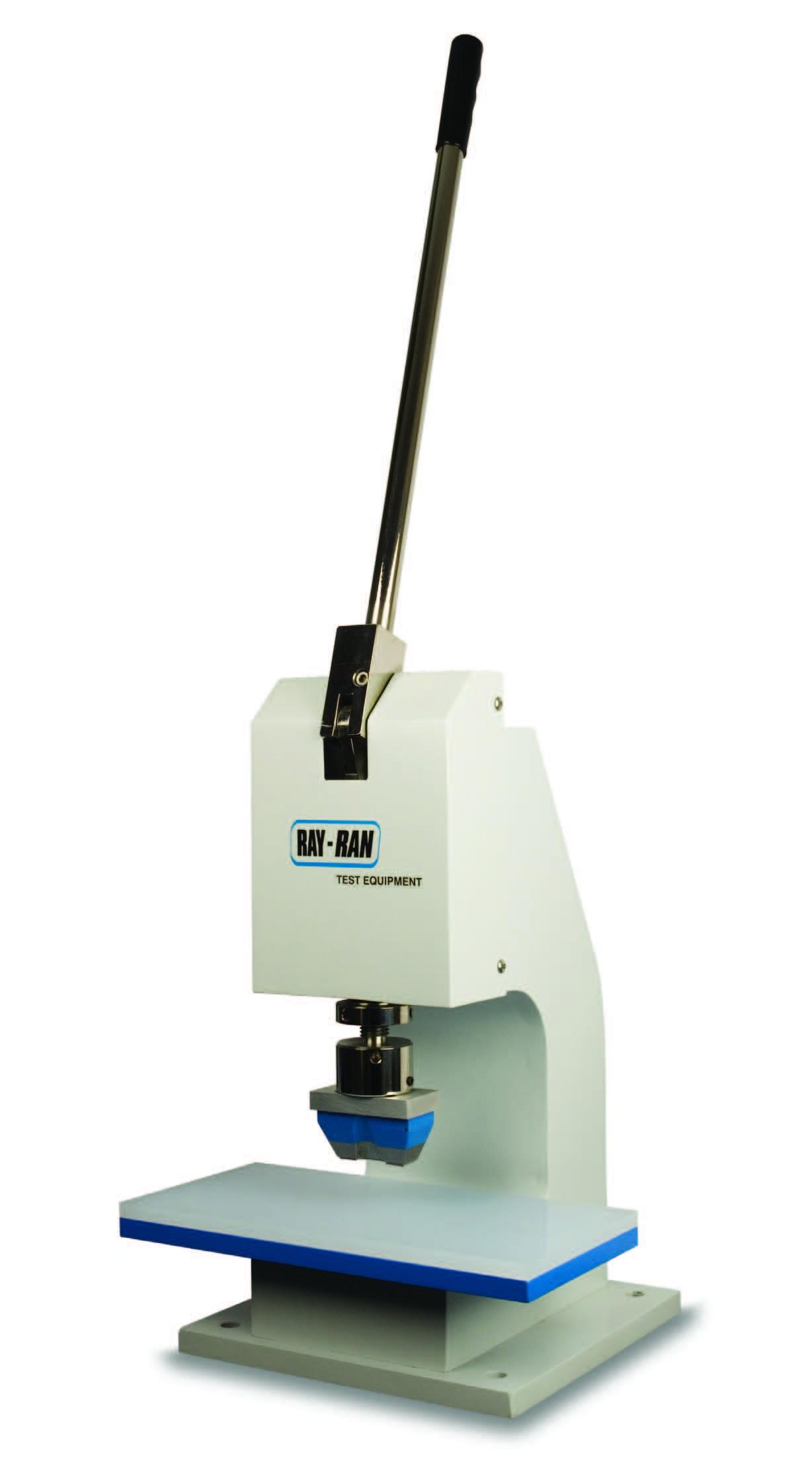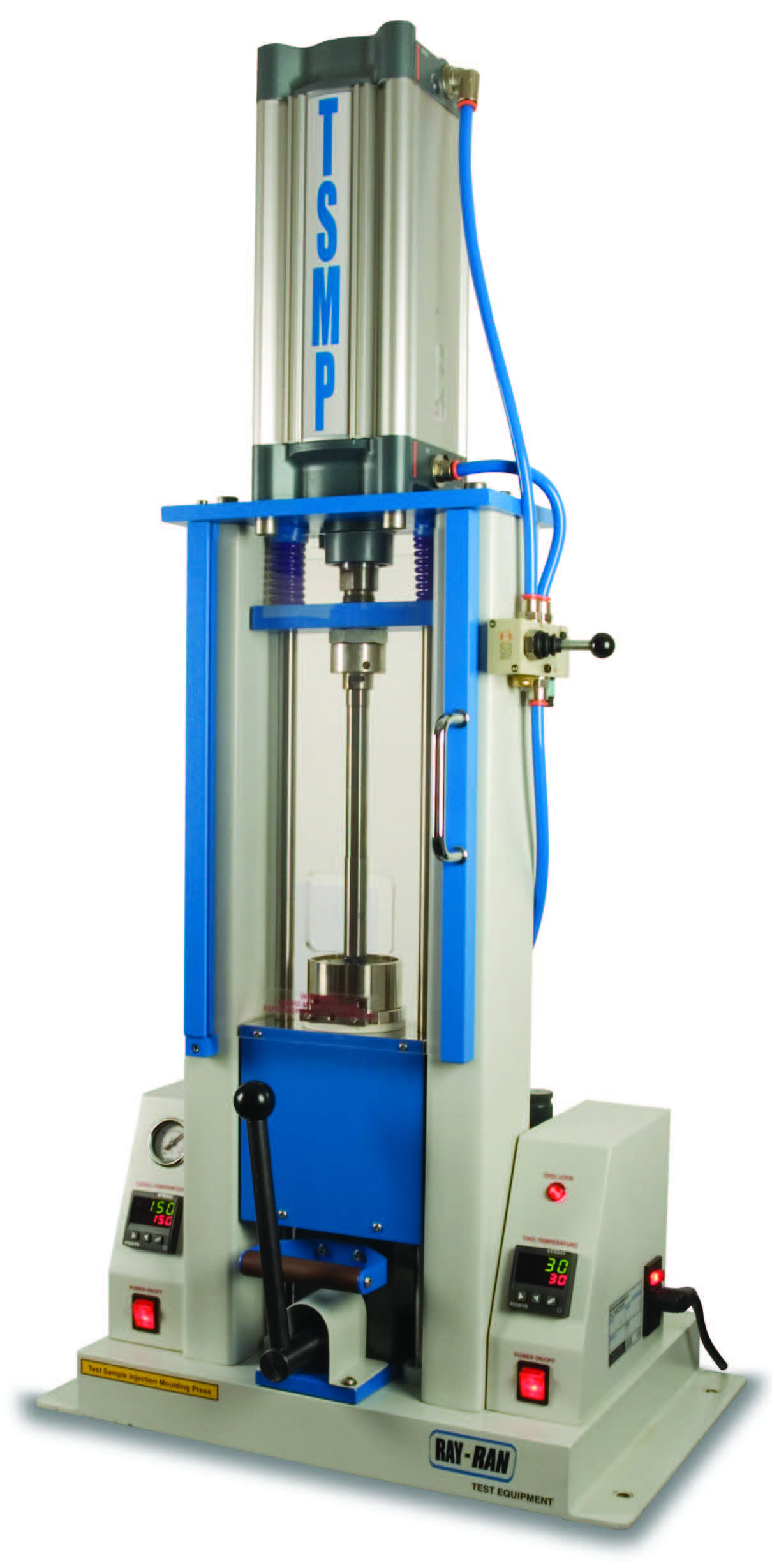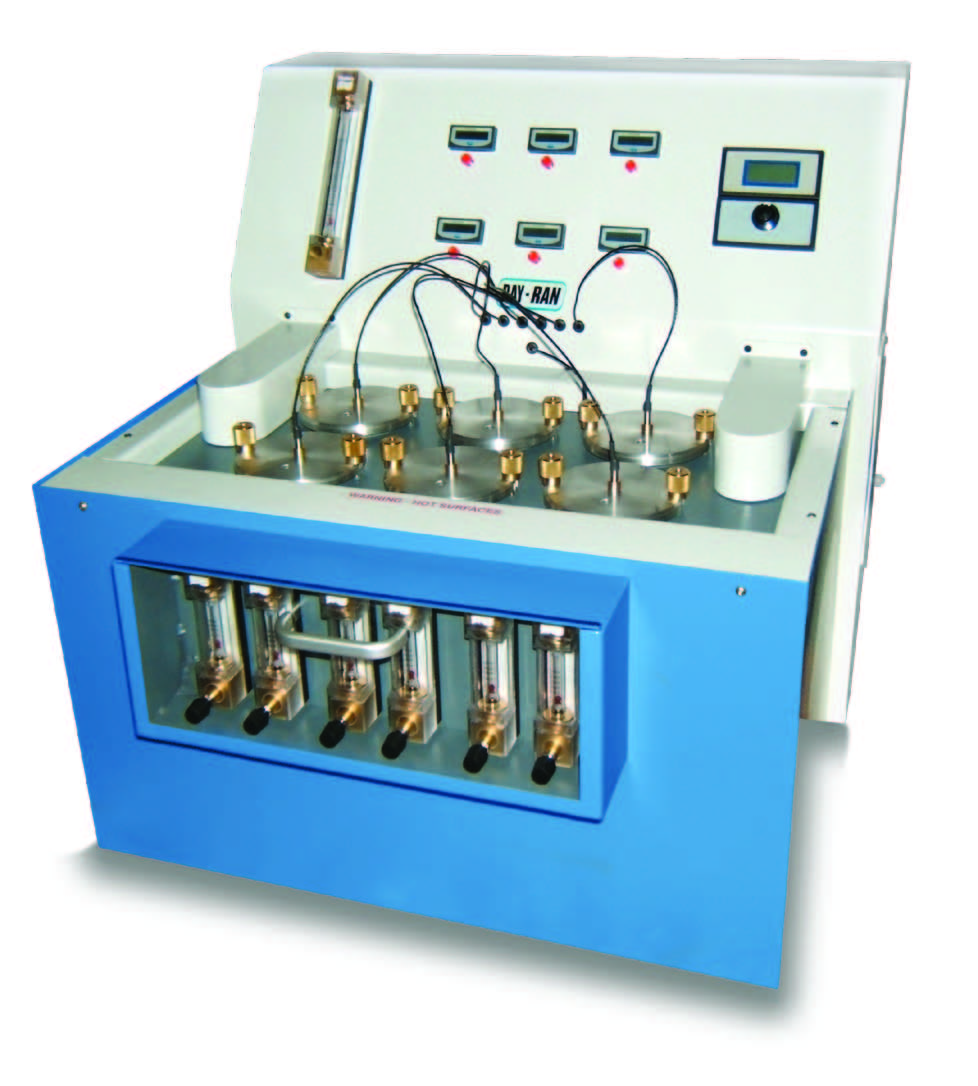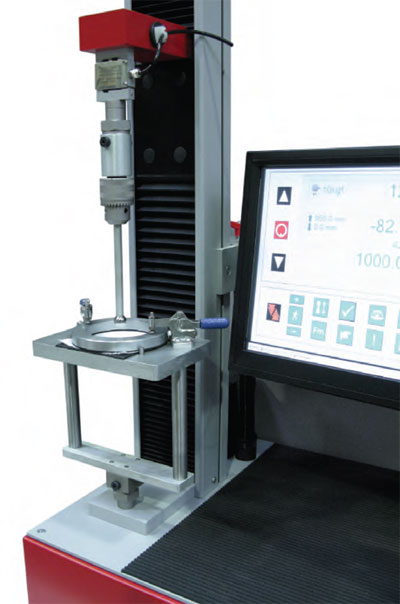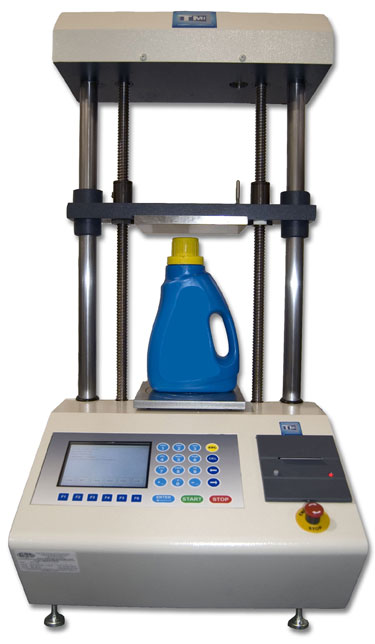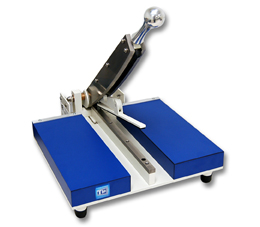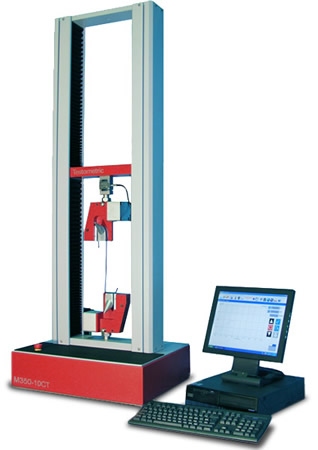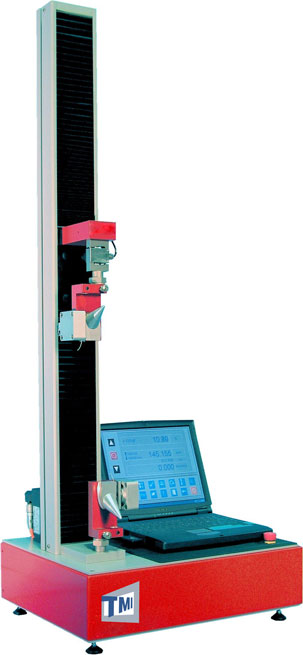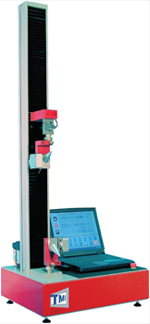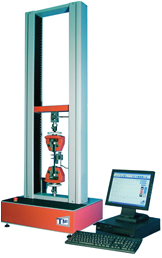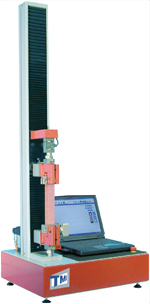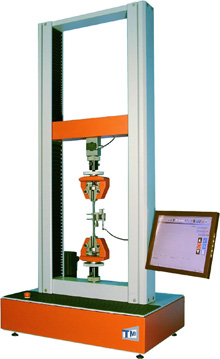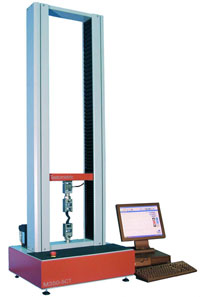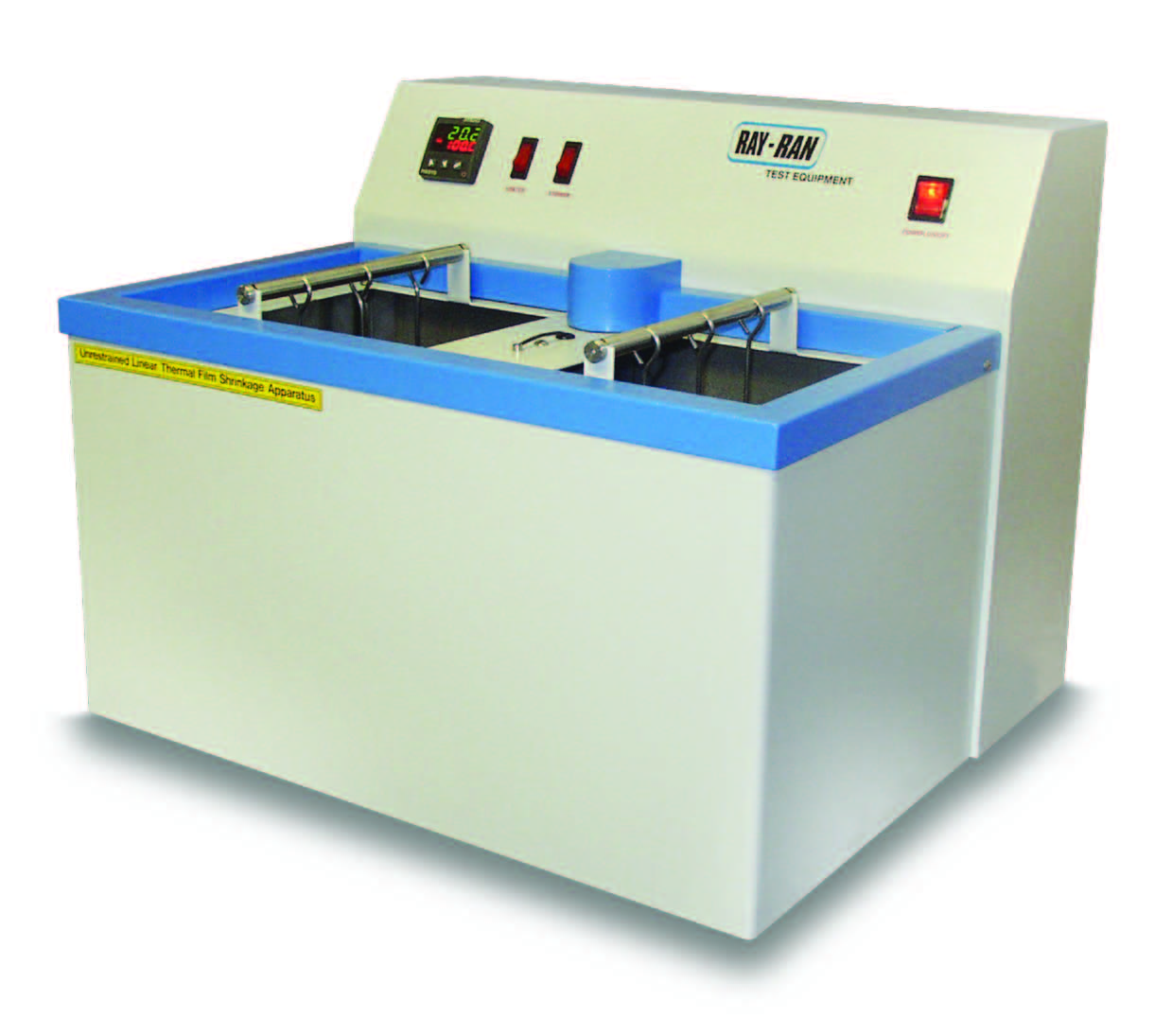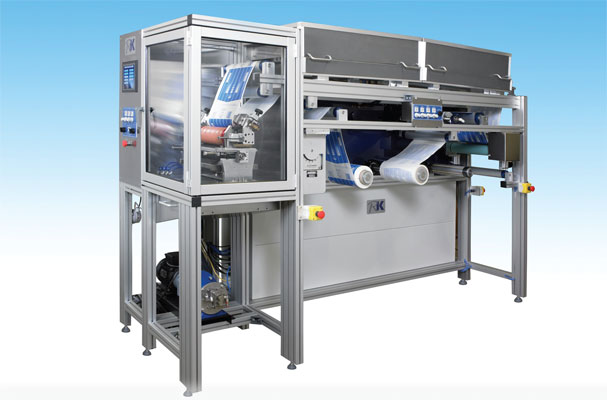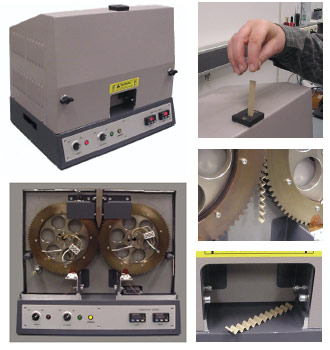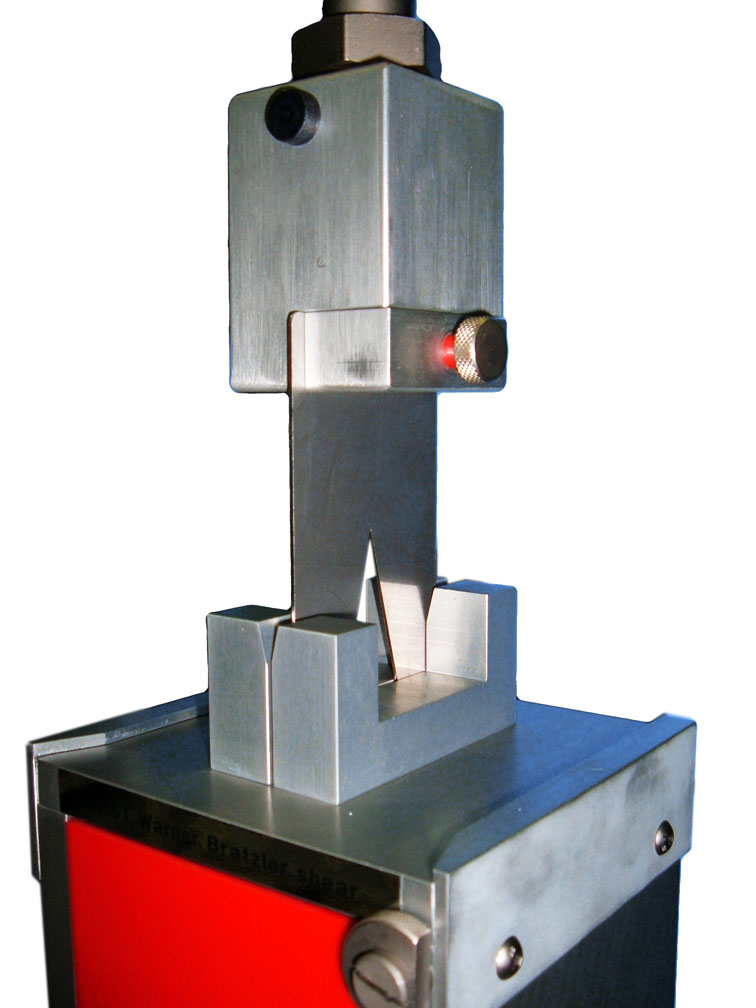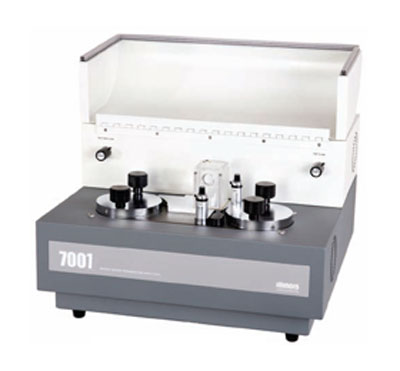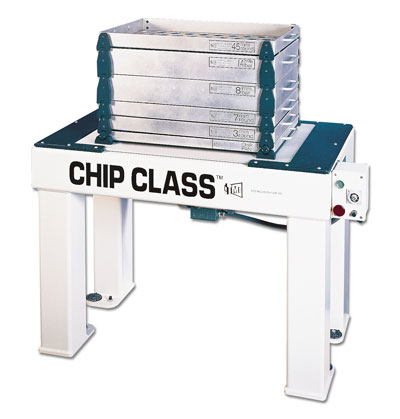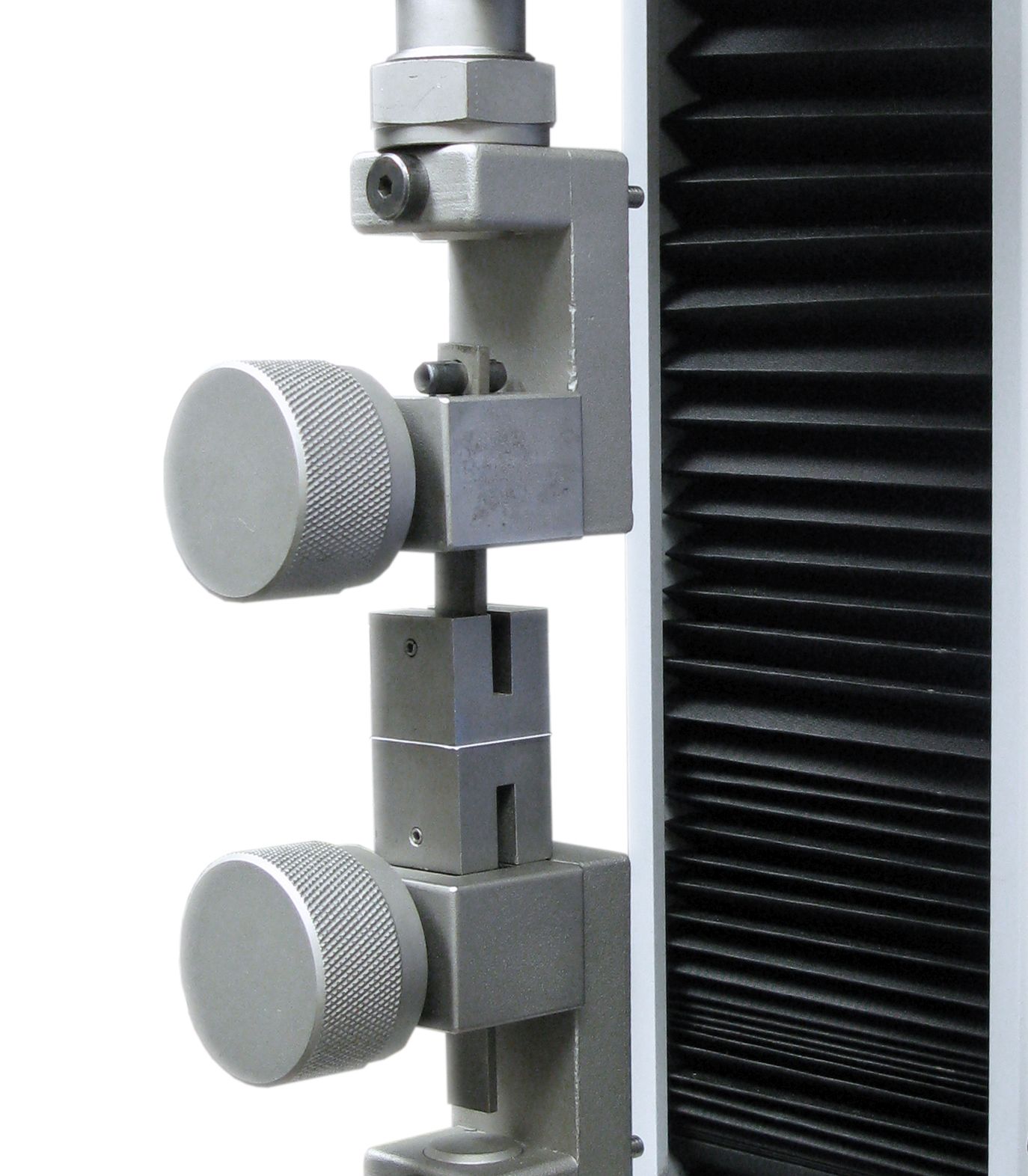Spencer Impact Tester, Attachment to 83-76
Film manufacturers that produce packaging materials for plastic bags and packaged goods require increased impact/puncture strength for product integrity during packaging and transport. Impact resistance of plastic films provide useful information to determine the energy required to puncture a film sheet. Two primary dynamic impact methods exist for measuring plastic film. The Dart Drop method based on ASTM D 1709 is a pass/fail test. The test records the weight of the dart which penetrates through the film sample. (See TMI Part # 43-61).
03-03 Graphmaster Pro
GraphMaster Pro is a PC software that connects your test instrument to the computer. After a test, the data is immediately visible on your PC. Here the data can be analyzed, stored and translated in a report. The GraphMaster software is compatible with all the Messmer Büchel and Testing Machines Inc instruments.
17-36 Short Span Compression Test (STFI)
The 17-36 Short Span Compression Tester measures the compression strength of paper and board. The span or gap is set to a distance between 0.3-0.7mm. When performing a compression test on such a short distance, the stability of the clamps and instrument are critical. The 17-36 Short Span Compression tester incorporates a precision mechanical design to reduce frictional errors, providing unmatched accuracy and repeatability.
17-38 S Tester
The 17-38 S-Test is a new test method developed in 2018 as an alternative to the CMT test. The new method was developed to measure the compressive strength of the flute/medium. A 15 mm wide specimen of uncorrugated medium is placed between two clamps. The span between the clamps is 4mm and the clamps have an offset of 1mm. The offset of 1mm compresses the flute to form an “S” shape during the test. The test result is the maximum compressive force. The S-Test can be correlated to the first plateau of the CMT.
22-22, 22-25 Precision Sample Cutters
In tensile testing or crush testing the accuracy of test results is not only dependent on the accuracy with which the procedure is carried out, but also on the accuracy of cutting the crush or tensile test samples. Some tests, for example, tensile strength and edge crush, are particularly sensitive, and cutting accuracy is a prime cause of variation in the values obtained. This model shows 3 precision tensile sample cutters and 2 crush sample cutters that are designed to eliminate the causes of errors associated with hand-cut samples.
33-24 Canadian Standard Freeness Tester (Wall Model)
Canadian Standard Freeness Tester determines the rate of drainage of a dilute pulp suspension and express it in terms of freeness. The rate of drainage is related to the work done on the fiber during beating or refining. Two models are offered: stand model (stainless steel) and wall model(brass).
40-20-10 Original Schmidt Live
The classic original Schmidt hammer was introduced to the paper industry to measure variability in paper roll tightness. The procedure determines the uniformity of the relative hardness profile of paper rolls, primarily containerboard. Roll hardness variations can be related to paper winding issues due to moisture, thickness or winding equipment. Downstream converting problems can occur if paper roll hardness variations are not controlled.
Advanced Melt Flow System
The 6MPCA is the most advanced digital model offered within the Ray-Ran range of melt flow index testers. The operating procedure is simple to undertake using its on-board advanced microprocessor technology. The large LCD provides onscreen instructions, reducing user error, and test parameters are easily entered via the keypad. The apparatus can accurately determine results for MFR, MVR and Density at test temperature.
Advanced Universal Pendulum Impact Tester
The Ray-Ran Advanced Universal Pendulum Impact Tester utilises advanced microprocessor technology to determine the energy required to break or rupture specimens such as plastics, composites, ceramics and non ferrous metals to International testing methods for Izod, Charpy and Tension Impact Testing. Along with Pipe Testing, Component Testing and Puncture Impact testing the Ray-Ran Universal Pendulum Impact Tester should more than meet all of your testing requirements.
Automatic Cobb Tester
The Automatic Cobb Tester offers a revolutionary new approach to measuring cobb values. Surpassing traditional manual methods of recording water absorption, the ACT provides a completely new and revolutionary method to measure cobb values dynamically in real-time.
Automatic Densimeter
The 21-10 Automatic Densimeter DSG-1 is a high precision instrument that offers accurate, simple operation in almost any laboratory environment. An electronic balance determines specific gravity of rubber, plastic, ceramic, and various other materials with the single push of a button. Specific gravity of the sample can be directly read on the indicator screen simply and easily.
Back Extrusion Food Set
In general, Food Texture Analysis tests are conducted using a multi-stage cyclic test method. Speed and size of probe are selected to suit the particular food, with a calculation typically comparing two cycles.
Basic Melt Flow Indexer
The Basic Melt Flow Indexer, often abbreviated as "MFI", is an affordable-price tabletop instrument used to test the melt flow resistance (MFR) of a wide range of thermo-plastic materials. The tester conforms to all National and International melt flow resistance standards, including BS EN ISO 1133 and ASTM D1238. Any temperature within 120°C-450°C (248°F-842°F) can be accurately controlled.
Beating and Freeness (Schopper Riegler)
The Schopper Riegler Beating and Freeness Tester is designed to determine the rate of drainage of a dilute pulp suspension and express it in terms of the Schopper Riegler (SR) value.
The SR value is the inverse of the volume of water collected divided by 10. The rate of drainage is related to the work done on the fiber during beating and refining.
58-05 Bekk Smoothness Tester
The Automatic Bekk Smoothness Tester is a microprocessor-controlled instrument for the determination of smoothness of paper and board according to the Bekk Method.
This air leak smoothness test is useful for very smooth surfaces, for example, coated label papers, coated free sheet, or other very smooth papers. Test results generate with the Bekk tester have shown excellent correlation with print smoothness evaluations using offset ink. Likewise, Bekk results have shown good agreement with subjective evaluations of low angle illuminated surface photomicrographs.
58-27 Bendtsen Roughness Tester
The Bendtsen Tester is able to measure both the roughness and porosity of paper and board. The instrument is easy to use. The 7-inch touchscreen uses intuitive icons.
58-29 Bendtsen Sheffield Roughness
Bendtsen Roughness and Sheffield Smoothness instruments measure the roughness of a paper surface. Surface roughness is directly related to a variety of paper end uses. Achieving and monitoring desirable print and coating quality are critical to producing a smooth sheet of paper.
17-40 Box Compression Tester 25kN CT
The Box Compression Tester is a four column, heavy duty tester designed to determine the compressive forces which a transport case is subjected-either in transit or stacked in a warehouse. Boxes can be tested to complete collapse or held automatically at predetermined load for a given period to evaluate stacking loads.
21-27 Bulk Density Apparatus for Testing Plastic
Bulk density apparatus is testing equipment used to measure the bulk density property of powder, granules and other “divided” solids, especially used in reference to mineral components (soil, gravel, sand), chemical substances, (pharmaceutical), plastics like polyethylene (hdpe or mdpe) pvc, polystyrene etc, or foodstuff and any other masses of granular or particulate matter. Bulk density is defined as the mass of many particles of the material divided by the total volume they occupy. The total volume includes particle volume, inter-particle void volume and internal pore volume.
13-61 Burst Tester for Corrugated and Board
Burst Testers are used as a multi-directional tensile test to identify failure in the direction of least resistance for evaluating bursting strength and fiber bond. Models are available to test a variety of materials. These models can also be fitted with a device to measure the deflection of the sample prior to burst.
The Burst Tester is designed to meet international standards for tests on paper, foils, paper boards, corrugated board, textiles etc.
13-60 Burst Tester for Paper and Foils
Burst Testers are used as a multi-directional tensile test to identify failure, called bursting strength, in the direction of least resistance for evaluating physical strength and fiber bond. Models are available to test paper, foils, and tissue. These models can also be fitted with a device to measure the deflection of the sample prior to burst.
The Burst Tester is designed to meet international standards for tests on paper, foils, paper boards, corrugated board, textiles etc.
13-62 Burst Tester for Textiles
Burst Testers are used as a multi-directional tensile test to identify failure in the direction of least resistance for evaluating physical burst strength and fiber bond in textile and nonwoven materials. Models are available to test a variety of materials. These models can also be fitted with a device to measure the deflection of the sample prior to burst.
The Burst Tester is designed to meet international standards for tests on paper, foils, paper boards, corrugated board, textiles etc.
35-12-03 Calibrated Gauge Blocks for 1/2" Micrometer
Includes blocks: .010", .10", .20", .30", .40", .50". Certificate of Compliance included. ASME B89 Grade 0.
33-23 Canadian Standard Freeness Tester (Stand Model)
Canadian Standard Freeness Tester determines the rate of drainage of a dilute pulp suspension and express it in terms of freeness. The rate of drainage is related to the work done on the fiber during beating or refining. Two models are offered: stand model (stainless steel) and wall model (brass).
61-04 Cobb Sizing Testers
Water absorptiveness (Cobb value) is the mass of water absorbed in a specific time by a 1 sq. meter sample of paper, board or corrugated under conditions specified in standards such as TAPPI T 441. Cobb sizing testers provide a simple, standardized method for fast determination of the quantity of water absorbed by a paper or board in a given time.
32-76e Coefficient Friction/Peel Tester
Testing Machines Inc., is globally recognized as the leading supplier of coefficient of friction instrumentation. Our NEW 32-76e coefficient of friction/peel tester uses advanced digital force signaling and high-speed data acquisition software to provide unmatched precision and repeatability in COF and peel testing.
Improved features include a color touchscreen display and intuitive software user interface for easy navigation and test method storage.
New peel testing capabilities include 180° peel and T-peel measurements.
32-25 Coefficient of Friction Tester
A friction tester, also called a coefficient-of-friction (COF) tester, makes a measurement of a sheet-like substrate such as paper, corrugated, plastic film or paperboard which determines the angle of inclination at which one substrate affixed to a sled will begin to slide/slip against the surface of another substrate of a similar material.
46-12 Cold Flex Temperature Tester
Designed and built by Ray-Ran, the Cold Flex Tester determines how low temperatures affect the torsional stiffness properties of flexible materials, including polyvinyl chloride extrusion compounds, by measuring the temperature at which a test specimen is twisted through a known angular displacement using a pulley system by a specified torque. The apparatus complies with BS2782: Part 1: Method 104B, ISO458/1, 458/2 and ASTM D1043 International Test Standards.
17-11 Corrugated Test Accessories
Accessories for the Compression Tester 17-76: Use the ECT fixture to turn the 17-76 or other units into a full edge crush tester, then switch it out with the RCT to turn it into a ring crush tester. See other fixture options below for flat crush testing, pin adhesion, etc. Then contact TMI for a price on any unit or talk to someone about your application.
17-76 Compression Tester
Designed in close cooperation with industry, the 17-76 Compression Tester is rugged enough for any production testing environment. Utilizing intuitive hardware features and menu-driven software, the 17-76 is designed to provide highly accurate measurement of compressive strength for a variety of materials.
30-01 Control Coater and Proofer
The K Control Coater widely used for the application of paints, varnishes, adhesives, liquid printing inks and many other surface coatings to produce quick, accurate and repeatable samples. These may then be used for quality control and presentation purposes, R& D and computer colour matching data etc. These are elements vital to a company’s success in the modern world.
17-11 Corrugated Test Accessories
Accessories for the Compression Tester 17-76: Use the ECT fixture to turn the 17-76 or other units into a full edge crush tester, then switch it out with the RCT to turn it into a ring crush tester. See other fixture options below for flat crush testing, pin adhesion, etc. Then contact TMI for a price on any unit or talk to someone about your application.
79-11 Crease & Board Stiffness
Crease and Board Stiffness testing is useful to industries of carton board, paper, printing and packaging. The relationship between board stiffness and crease recovery (spring back) is an important factor in the performance of cartons on high speed packaging machines and in manual folding. It is crucial to have the creases in boards correct and uniform. The crease recovery (spring back) can result in forces, which distort the carton or cause stresses to be applied to closures, which reduce their effectiveness.
17-56 Crush Tester
The Crush Test is designed as a robust, easy to-use instrument. Exactly what you need when performing crush tests. The Crush Tester is suitable for a wide variety of samples, including corrugated board, tubes, paper and plastics. The special sample holders extend the instrument’s possibilities. The accuracy is achieved with a precision load cell, which is even accurate at low force values.
21-25 Density Gradient Column for Polymers
The Auto Density Gradient Column System has become the world’s benchmark for accurate density measurement of small solid polymer specimens using the column method according to ASTM D1505. Offered as a 3 or 6 column version, the built in on-board Microprocessor System accurately calculates the specimen’s density more quickly and more accurately by using the latest linear encoder technology that measures the samples position in the column relative to the calibrated glass marker floats. Once the correct position of the sample is recorded the density is displayed on the LCD screen.
10-20 Digital Ink Rub Tester
The Digital Ink Rub Tester using ASTM D 5264 and is designed to measure scuffing or ink rub resistance. Several tests can be performed including dry rub (the amount of transfer ink from one dry surface to another), wet rub (the amount of transfer of ink from wetted surface to another), wet bleed or transfer (ink transfer to a water-saturated blotter), wet smear (similar to wet bleed with the addition or rub cycles), functional rub/wet rub (smear or transfer tests using a liquid other than water and hot abrasion). An optional heated weight provides the 10-20 Rub Resistance Tester with a uniform test for evaluating hot abrasion resistance of printed materials like fabric, plastics.
49-86 Digital Micrometer
The NEW model 49-86 Thickness Gauge for paper, film, and non-wovens combines a precision digital linear encoder measuring system with an ultra-clear, easy-to-read digital display. The unit has a measurement range of range: 0-0.050 in. (0-1.27 mm) and designed for very thin materials such as thin plastic films, paper, non-woven textiles, board and battery separators. The motor-driven instrument utilizes the dead weight micrometer principle for high accuracy and repeatability. Each unit is designed and manufactured for use where the utmost precision is required.
49-56 Digital Micrometer
The model 49-56 Digital Micrometer combines unmatched accuracy and resolution, a modern contemporary look with a robust mechanical design and new improved electronics, including a digital linear encoder. The unit has a measurement range of 0 – 10.0000 mm (0 - 10,000.0 um), 0 - 394.000 mil. Designed for thickness measurements of sheet materials, the 49-56 can be configured to meet any ISO, ASTM, EDANA or other International specifications for paper thickness, corrugated, plastics, plastic film, tissue paper, nonwovens, textiles and other sheet-like substrates.
49-85 Digital Micrometer for Paper
Designed specifically with the paper industry in mind, the 49-85 micrometer is configured to meet the international specification and test standard for paper and board, TAPPI T 411.
43-61-01 Falling Dart Impact Tester
The Ray-Ran Manually-operated Drop-Dart Impact Tester provides a basic method for determining the energy that causes thin flexible materials such as plastic film, paper and composite sheets to fail under specified conditions of impact from a free falling dart. The energy required to tear or puncture the test specimen is expressed in terms of the darts weight which would result in the failure of 50% of specimens being tested.
68-96 DAT Dynamic Absorption Tester
Contact angle measurement is an empirical tool for understanding the wetting between a liquid and a substrate. The DAT Dynamic Absorption Tester offers a range of integrated instruments, for research as well as quality control. These instruments enable real-time, automatic analysis at full video speed of the interaction between a liquid droplet and a specimen surface. The time-dependent wetting and liquid penetration correlates to many experienced production problems in surface coating, sizing, printing and adhesion.
83-76 Elmendorf Tear Tester
An automatic, digital tear tester equipped with an optical encoder for measuring the angular position of the pendulum during tearing and converting this measurement to tear strength units. A large, full-color touchscreen display with intuitive, easy-to-use software provides a revolutionary new approach to testing and data review.
43-62 Falling Dart Impact Tester Advanced
This new Ray-Ran Bench-Top Falling Dart Impact Tester provides a method for determining the energy that causes thin flexible materials such as plastic film, paper and composite sheets to fail under specified conditions of impact from a free-falling dart.The energy required to tear or puncture the test specimen is expressed in terms of the dart’s weight which would result in the failure of 50% of specimens being tested per ASTM and ISO testing standards.
43-26, 43-27 Falling Dart Impact Testers
The Falling Dart Impact Tester is intended for the determination of mechanical properties of packaging material such as plastic films, laminates and paper.
From Messmer Büchel BV, a TMI Group of Companies brand.
43-60 Falling Weight Impact Tester
Designed and built with operator simplicity in mind, the Ray-Ran Universal Falling Weight Impact Tester is simply the best in its class. It is used to determine the energy required to break or rupture test specimens such as pipe, sheet, laminates, composites, ceramics and non ferrous metals for material and component evaluation to international testing methods such as ISO6603, ISO3127 and ASTM D2444 to name a few.
71-03 Fiber Classifier (1 Tank) Bauer Type
The Fiber Classifier segregates a fiber sample into groups of different lengths to allow the proportion of each group to be measured, by weight. Uniform operation is assured by a constant flow of water through the stainless steel inlet system. Chose from models with one to five units.
84-08-60 Food Puncture Probe
In general, Food Texture Analysis tests are conducted using a multi-stage cyclic test method. Speed and size of probe are selected to suit the particular food, with a calculation typically comparing two cycles.
30-77 Gravure Proofer
High quality proofs using gravure inks of press viscosity are produced instantly using the 30-77 High Speed Gravure Proofer. Featuring a microprocessor controlled servo drive and pneumatic operation, electronically engraved printing plates and variable printing speeds of 1 to 100m/min, this is an essential tool for all those involved in the manufacturing or use of liquid inks. Ideal for R&D and computer colour matching data, quality control and presentation samples, the 30-77 High Speed Gravure Proofer is very easy to clean.
30-15 Hand Coater
The K Hand Coater provides a simple but effective means of applying paints, printing inks, lacquers, adhesives and other surface coatings onto many substrates. Two or more coatings can be applied side-by-side in a single operation making the system ideal for comparing products.
75-58 Heat Sealer TS-12
The TS-12 is one of the most precise and consistent table top sealers available, perfect for laboratory heat sealing applications. The heat sealer is designed to produce heated crimp seals for flexible packaging materials. The digitally controlled heat sealer allows independent upper and lower seal jaw temperature and accurately controls the temperature across the entire length of seal.
75-59 Heat Sealer TS-4 with Interchangeable Seal Jaws
The TS-4 is a laboratory Heat Seal tester used to prepare heat seal samples for the measurement of sealing strength of flexible packaging films, film foil laminates, nonwovens and other substrates.
73-19 Hot Disintegrator
With hot disintegration, pulp shows complete development of strength properties without further treatment. Disintegration time is typically reduced from 15 minutes to 2 minutes
46-08 Hot Plate Film Shrinkage Apparatus
Designed and manufactured by Ray-Ran, the Hot Plate Thermal Film Shrinkage Apparatus is used to determine the thermal shrinkage of plastic film & sheeting and is ideal for most quality control procedures where precise results are essential.
75-50 Hot Tack Tester & Seal Tester SL-10
The SL-10 Hot Tack Tester & Seal Tester, is the most precise and consistent heat seal tester in the packaging industry! Testing capabilities include: heat sealing, heat-seal testing and hot-tack testing. The SL-10 provides critical information needed to determine ideal sealing conditions for packaging films.
10-18 Ink Rub Tester
The ASTM D5264 Rub Tester is designed to measure scuffing or rubbing resistance. Several tests can be performed including dry rub-the amount of transfer ink from one dry surface to another, wet rub-the amount of transfer of ink from wetted surface to another, wet bleed or transfer-ink transfer to a water-saturated blotter, wet smear-similar to wet bleed with the addition or rub cycles, functional rub/wet rub-smear or transfer tests using a liquid other than water and hot abrasion. An optional heated weight provides a uniform test for evaluating "hot abrasion" rub resistance of printed cartons, rub test for labels etc.
Internal Bond Sample Prep Station
A consistent method of sample preparation is necessary to insure repeatable test data. The TMI Ibond prep station automatically presses and cuts test specimens to exact requirements providing significant improvements in testing precision. The 80-30 Sample Prep Station provides a consistent adhesive transfer when pressing the test specimen between the double-sided tape and aluminum platens.
80-26 IBond
The Internal Bond™ Tester is designed to determine the internal bond strength of a variety of Paper and Board materials according to TAPPI T 569 and ISO 16260. The instrument design is based on a falling pendulum which creates a high speed impact on a paper specimen. The paper specimen is sandwiched between two double-coated tape substrates. The pendulum impact measures the total energy required to delaminate the internal fibers of a specimen in a “Z” type direction into two plies
32-91 Lab Master Slip & Friction Tester with Elevator System
The 32-91 Lab Master® Slip and Friction Tester with Elevator System is designed to precisely determine the friction characteristics of a variety of materials. The instrument removes operator variability from the test procedure with specially designed features to control sled placement rate, orientation/angle, dwell time, and removal.
32-91 Lab Master Surface Softness Tester
The 32-91 Lab Master® Surface Softness Tester is designed to precisely determine the frictional softness characteristics of tissue paper and non-woven products and produces immediate, operator-independent measurement of surface friction that correlates with sensory panel data. A highly sensitive load beam is capable of measuring frictional force between 0.1-100.0 gram. A wire-wound sensor is attached to the load beam and is pulled across the sample at a defined speed.
84-92 Lab Master ZDT Z-Directional Tensile Tester
The measurement of Z-Directional tensile strength was developed to determine the structure of a sheet of paper or board when subjected to tensile stresses in the out-of-plane direction or Z-Direction. Z-Directional Tensile Strength is a measure of the internal fiber bonding strength of a substrate.
32-71 Lab Measure Slip & Friction Tester
The 32-71 Lab Measure Slip and Friction Tester is designed to precisely determine the friction characteristics of a variety of materials. The instrument removes operator variability from the test procedure with specially designed features to control sled placement rate, orientation/angle and removal.
72-16 Valley Laboratory Beater
A Valley-type beater for beating pulps under standardized laboratory conditions. Pulp fibers in aqueous suspension pass between a set of stationary and rotating metal bars under controlled conditions of rate and pressure. The beater may be used to produce pulp samples at increasing degrees of beating, from free to wet, which may then be formed into laboratory hand sheets for physical property measurements. Thus it is possible to assess the paper making potential of pulps without the necessity of full-scale trials.
72-15 Laboratory Pulp Refiner PFI Type
A a self-contained, PFI-type pulp beater that subjects pulp to a specific beating schedule to process pulp prior to forming handsheets.
22-32 Sample Cutter
TMI offers a wide line of cutters to accommodate all of your laboratory sample preparation requirements in tensile samples and other test methods . Edges line up flush. Burrs are virtually unknown. Blades move effortlessly through even the toughest materials.
46-05 Low Temperature Brittleness Tester for Plastic
Ray-Ran, a sister company to TMI, is a manufacturer of a Low Temperature Brittleness Tester. This testing instrument been designed to study the effects low temperatures have on plastic or rubber-polymer materials when subject to impact loads and conforms to ASTM D746 testing requirements as well as ISO R974 International Test Standards. Many plastic materials which are flexible at normal ambient temperatures become brittle at low temperatures which severely affect the materials impact strength for fracture. By plotting the percentage failure rate of the test samples against the reduction in temperature, the brittleness temperature of the test samples can be measured.
Temperature Controlled Impact Tester
Designed to evaluate impact endurance of plastics and other various materials at low temperatures.
31-23 MIT Folding Endurance Testers
With this machine, a pliable specimen is placed under a constant tension load. The specimen is then folded to an angle of 135° in either direction, at the rate of 175 double folds per minute until the specimen is severed at the crease. A variable folding rate option allows the operator to vary the folding rate between 20 and 175 double folds per minute.
22-05 Motorized Notching Cutter
Used in conjunction with the Model 43-76 Impact Tester, the TMI Motorized V Notch Cutter, Model 22-05, produces a v notch in an impact test specimen for ASTM D 256 and ISO 180 according to the Izod Standard. Charpy test notches can also be made according to ASTM D 6110 and ISO 179.
OTMS Forward Extrusion Food Set
In general, Food Texture Analysis tests are conducted using a multi-stage cyclic test method. Speed and size of probe are selected to suit the particular food, with a calculation typically comparing two cycles.
Oxygen Permeation Analyzer 8001
The 8001 is a versatile and easy to operate oxygen permeation analyzer with 2 stations for testing films or packages. Offering the highest quality coulometric oxygen sensor in the market with the lowest replacement cost, this instrument provides extremely fast purge down times and accurate readings at the lowest levels. With the widest measurement range in the market, this analyzer can be used for research and development permeation testing and has the speed required for use in Quality Control testing.
Oxysense 5250
The OxySense innovative line of non-invasive oxygen monitoring and permeation systems, is the oxygen measurement instrument of choice for labs and individuals who need to test or evaluate bottles, packages and other packaging materials through a variety of studies.
49-87 Paper Micrometer
The NEW model 49-87 Paper Thickness Micrometer combines a precision digital linear encoder measuring system with an ultra-clear, easy-to-read digital display. The unit can measure paper thickness in a range: 0-0.50 in. (0-12.7 mm) and is designed for thick materials such as corrugated, paper board, tissue paper, battery separators, plastic sheets and non-woven The motor-driven instrument utilizes the dead weight micrometer principle for high accuracy and repeatability. Each unit is designed and manufactured for very high precision.
40-20-01 Paper Roll Hardness Tester (Recording)
The Schmidt Roll Hardness Tester determines the hardness of large rolls of paper, film and foil. It provides fast, accurate, non-destructive hardness profiles of rolls to assure smooth and efficient printing. Rolls that are too hard, or too soft, rolls that are unevenly wound, or rolls with different moisture contents can cause difficulties during the printing process. The Schmidt Roll Hardness Tester is often used in conjunction with the Smith Roll Tightness Tester (TMI 40-54-00) to provide a complete profile of roll properties.
40-20-02 Paper Roll Hardness Tester (Standard)
The Schmidt Roll Hardness Tester determines the hardness of large rolls of paper, film and foil. It provides fast, accurate, non-destructive hardness profiles of rolls to assure smooth and efficient printing. Rolls that are too hard, or too soft, rolls that are unevenly wound, or rolls with different moisture contents can cause difficulties during the printing process. The Schmidt Roll Hardness Tester is often used in conjunction with the Smith Roll Tightness Tester (TMI 40-54-00) to provide a complete profile of roll properties.
40-23 Paper, Film and Foil Roll Hardness Tester
PaperSchmidt is the first rebound hammer designed specifically for roll hardness testing. A new measuring principle and a high compliance plunger provide unsurpassed roll profiling accuracy and repeatability. In addition to this, it has an extended lifetime to cope with the heavy demands of the paper, film and foil industry and dedicated tools such as pre-defined tolerances that make assessing the profile a simple matter.
40-24 Paper, Film and Foil Roll Hardness Tester
Model 40-24 enables the user to quickly and precisely diagnose roll imperfections, hardness inconsistencies and uneven winding, thereby preventing problems during printing and converting operations. Portable and lightweight Model 40-24 is perfect for roll hardness testing in the warehouse or on the production floor, providing an immediate visual assessment of the hardness profile.
58-06 Parker Print-Surf (Single Head)
The Parker Print Surf measures the roughness of a wide variety of samples according to the Dr. John Parker method. With its high speed and pressure setting the Parker Print Surf simulates the way ink is applied during the printing process. The clamp pressure is adjustable making it possible to simulate different printing settings. The instrument is used for fine paper, coated paper, newsprint, coated board, linerboard, films and foils, packaging and carton board. A porosity head is available as an option to test the air permeancy.
30-25 Paste Ink Proofer
The Paste Ink Proofer is used for quick, repeatable and highly accurate proofing and color-matching of all types of litho, web-offset, letterpress inks and varnishes. It is unique in featuring automated operation, eliminating the need to weigh or measure ink samples.
43-76 Pendulum Impact Tester
The new 43-76 Pendulum Impact Tester uses a high resolution optical encoder and state-of-the-art data acquisition software to determine the impact resistance of rigid materials like plastic in accordance with a wide variety of ASTM and ISO test standards for Izod, Charpy, Chip Impact, and Un-Notched Cantilever Beam testing.
22-70-02 Pneumatically Operated Test Sample Cutting Press
The Pneumatically Operated Test Sample Cutting Press is by far the most effortless and safest way to produce cut samples from materials such as plastics, fabrics, boards and paper. The press is robust and compact using a limited amount of space and is ideal for any laboratory or workshop without the need to be bolted to a bench or worktop.
68-76 PocketGoniometer PGX+
The Model 68-76 PocketGoniometer PGX+ is an electronic, video-based, contact-angle goniometer designed for quality control applications. To perform a measurement, simply place the portable instrument directly on the specimen and press “start.” No sample cutting or preparation is required, saving set up time and eliminating the need for sample manipulation.
58-04 PPS Calibration Kit
The Parker Print-Surf (PPS) Test and Calibration Set enables the instrument user to make statistically valid calibration checks traceable to the reference instrument. The set includes three sets of six discs (18 in total), each set has a different roughness value assigned to it after measurement on the reference instrument. Nominal roughness values are set to cover ranges for previous and current models of Parker-Print Surfs.
Preventative Maintenance & Calibration
PM&C is on-site maintenance and calibration service, available on a regular schedule, for your test instruments. Wherever you are located, it is a practical, cost-effective way to make sure your instruments maintain proper working performance.
Preventative Maintenance and Calibration Services
Preventative Maintenance and Calibration Services are available for your entire laboratory, regardless of manufacturer. Instruments in your facility will be calibrated using industry-wide, internationally recognized (NIST, etc.) standards.
Probe Tack Adhesion Fixture
The Probe Tack Adhesion Fixture is a tool used for the measurement of the pressure sensitive tack of adhesives. Tack is typically measured as the force required to separate an adhesive and the adherend shortly after having been brought into contact under a defined load of known duration at a specified temperature. Tack is measured as the maximum force required to break the adhesive bond.
35-05-01 Programmable Test Stand (w/ PC Stand)
The Programmable Force Tester is a highly configurable motorized test stand for tension and compression testing applications up to 1.5kN (300 lb). The stand can be controlled from the front panel or via a computer and is fully compatible with Nexygen TCD software.
30-23 Proofer K-Lox
The K-Lox Proofer is the simplest method of applying flexo inks and other fluid coatings onto any substrate to produce accurate and repeatable proofs that closely resemble conventional flexo-printing.
73-18 Pulp Disintegrator
Disintegration of a pulp sample is the mechanical treatment, in water, of interlaced fibers to separate them from one another.
83-05 Puncture Propagation Tear Tester
The Puncture Propagation Tear Resistance Tester allows manufacturers and users to determine the potential strength/weakness and resistance to snag or puncture for films, foils and fabric.
22-80-00 Ray-Ran Motorized Notch Sample Cutter for Izod and Charpy Impact Testing
To automatically produce precise stress concentrated notch profiles on Impact and Charpy specimens look no further than the Ray-Ran Auto-cycle Notch Cutter for Izod and Charpy Impact Tester Sample preparation. A world leader by design, this machine will cut accurate notch profiles to international test standards such as ISO 179, ISO 180 and ASTM D256 on impact machines from TMI, Ray-Ran, and other impact tester manufacturers. [The 22-80-00 replaces the TMI Model 22-05 impact notch cutter]
80-91 Lab Master Release & Adhesion Tester
The Lab Master® Release and Adhesion testing system measures the peeling strength of pressure sensitive adhesives and release strength of labels. The unit meets a variety of international standards such as ASTM, FINAT, TLMI and other standards. Methods are user-defined, saved and selected through a PC- based touch screen display operating under Windows® based application software. The software offers the ability to create user-defined test set-ups, individual test speed selection, user-definable default areas for analysis, and enhanced calibration. Test data visually represents the characteristics of the peel.
30-60 RK Flexiproof 100
The Flexiproof 100 provides high-speed production of proofs using water, solvent or UV flexographic inks. Costly pilot runs on printing presses are no longer needed. The Flexiproof is essential to companies that use or manufacture flexo inks.
22-42 Circular Sample Cutter
We offer a wide line of cutters to accommodate all of your sample preparation requirements for fabric textiles and corrugated board. Circular Cutters are used to create a circular sample normally for weight determination.
22-76 Corrugated Sample Cutter
The 22-76 Corrugated Sample Cutter is designed to cut a variety of corrugated sample sizes for Edge Crush Tests (ECT) and Pin Adhesion Tests (PAT).
The heavy-duty adjustable width cutting head and precision slide system assures precise, parallel edges. Its single-beveled blades provide clean, square cuts. The instrument is rugged, portable, and does not require air or electric connection, allowing its use in almost any environment.
22-70-04 Sample Profile Cutter - CNC1
Designed and manufactured by Ray-Ran the Model 1 CNC Sample Profile Cutter is rapidly becoming the best bench top milling machine in its class.
The 3 axis rapid prototyping vertical milling machine is ideal for cutting hard dense polymer sheets and laminates up to 40mm thick as well as polyethylene and polypropylene pipes that are used within the gas and water industry. The versatility of the machine makes it ideal for Research and Development departments, Laboratories and Universities.
73-60 Sheet Former (Standard)
The Standard Sheet Former includes all of the accessories required to prepare 159 mm hand-sheets in accordance with the appropriate standards. This stainless steel device produces laboratory hand sheets to allow the test and evaluation of the physical properties of pulp.
73-62 Sheet Former, Semi-Automatic
The Semi-automatic Sheet Formers create standardized laboratory hand-sheets that allow the physical properties of the pulp to be evaluated. Semi-automatic operation eliminates operator influence, ensures high repeatability, and increases sheet output compared to standard sheet machines.
73-61 Sheet Former, Semi-Automatic, Space Saver
Semi Automatic Stainless Steel Sheet Former - Space Saver is a self-contained, floor standing model. The 316 stainless steel cabinet eliminates the need to install the unit within a laboratory bench.
17-34 Short Span Compression Tester
The Short Span Compression Tester is an advanced microprocessor-controlled instrument for determining the compression strength of fluting medium or test liner, and offers unrivaled repeatability and reproducibility. Considerable cost savings are possible through accurate prediction of corrugated component performance.
32-07 Slip and Friction Tester
The Slip and Friction Tester is designed to measure the sliding resistance of sheet like materials including plastic film, packaging film laminates, paper, paperboard and coated surfaces.
40-54 Smith Roll Tightness Tester
The need to measure the winding process of a roll of paper or plastic film is critical to the quality of the finished product. The Smith Needle test or Smith Roll Tightness tester was developed to measure the tightness or hardness of a wound roll structure of paper, paper board or plastic film. The Smith Roll Tightness Tester is a hand-held device which measures the force required to penetrate a needle between the wraps of a wound roll to a maximum depth of 7mm. A series of measurements are taken between the center core and outer edge of the roll structure. A force gauge based on Smith units measures the frictional force to penetrate and separate the individual layers providing an edge tightness profile.
46-03 Advanced HDT VICAT Softening Point Apparatus - 2 and 4 Station
Designed and built to cover multiple international testing standards, the Ray-Ran Advanced HDT/Vicat Apparatus utilises microprocessor technology to accurately determine the deflection and softening point characteristics of all thermo plastic test specimens.
46-03 Advanced HDT VICAT Softening Point Apparatus - 6 Station
For maximum testing capability look no further than the Ray-Ran Advanced 6 Station HDT/Vicat Apparatus. Built for multiple simultaneous testing of 6 samples to HDT or Vicat testing methods, the apparatus uses dedicated microprocessor technology to accurately determine the deflection and softening point characteristics of all thermo plastic test specimens. Its operator simplicity and high accuracy, makes the apparatus ideal for product development and quality control and has been designed to meet multiple International Testing Standards.
71-20 Somerville Screen
The Somerville Screen is designed to ensure that no fiber useful for paper making is included in the shive content and that no significant fiber bundles are present in the accepted stock. Although originally designed for determining shive in ground wood pulps, the method is applicable to all mechanical pulps and chemical pulps. It is also used extensively for determining the contraries (stickies) remaining in recycled waste furnishes.
83-20-08 Specimen Cutter for Elmendorf Tear Tester
The Specimen Cutter, with its triple shear cutting blade and rigid construction, produces precise samples in a simple, reliable manner. This accuracy in sample preparation adds to the overall dependability of the test procedure and ensures repeatable results every time.
This cutter is very easy-to-use with simple operation and produces 2.5 x 3.0 in. (63 x 76 mm) test pieces.
68-15-10 Spectro-Guide Sphere Gloss
The new spectro-guide S family offers improved technical performance for 60° gloss in the low gloss range 0 - 10 GU. The excellent repeatability of ± 0.1 can be guaranteed due to a patented calibration procedure. In addition, the spectro-guide S spectrophotometer offers unique benefits to always guarantee precise results.
73-17 Speed Dryer
For rapid drying of hand sheets after pressing, prior to evaluation. The uniformly distributed heat from the drying surface reduces the moisture content of paper samples.
46-02 Standard Melt Flow Equipment - 6MBA Manual
The 6MBA is the basic model offered within the Ray-Ran Range of Melt Flow Indexers. The manually operated test procedure is very simple to undertake. Molten Polymer is extruded through a closely controlled orifice (die) from the apparatus using pre set conditions of temperature and pressure produced by a dead weight system. The extruded polymer is cut off manually and is then weighed. Using the time interval to extrude the polymer its flow rate over 10 minutes can easily be determined, thus giving the Melt Flow Index (MFI) or Melt Mass Flow Rate (MFR) in g/10 min. By conducting a simple Density Test at test temperature on the same material using the same pre set conditions and a known piston travel distance the Melt Volume Rate (MVR) can also be determined.
80-10 Tackiness Checker HTC-1
The Tackiness Checker HTC-1 is a convenient, easy-to-use instrument that was developed to allow on-site testing of the tackiness of rubber components. The instrument may also be used to test the tackiness of adhesive tapes, depending on the application.
84-56 Horizontal Tensile Tester
The NEW model 84-56 Horizontal Tensile Tester combines a modern contemporary look with a robust mechanical design and new improved electronics including a color touch screen and user-friendly interface. The menus are interactive and the large buttons are designed for easy access.
84-01 Tensile Testing Machine with Digital Control
A fully digital universal-tensile testing system with high precision control and accuracy for performing tests in tension, compression, flex, shear, and peel. It includes automated computer control of test methods using high resolution auto-ranging load cells with accuracies better than +/-0.5% down to 1/1000th of the load cell capacity for accuracy and simplicity of operation.
22-70-01 Hand Operated Test Sample Cutting Press
Specifically designed to cut test samples such as tensile bars from relatively flexible sheet, the Ray-Ran Hand Operated Test Sample Cutting Press will produce samples from plastics, fabrics, boards and paper. In most cases, the thickness of the material that can be cut will not just depend on the strength of the material, but also on the lateral flexibility of the material to allow the cutter to penetrate down into, and pass through the material.
22-70 Test Sample Injection Molding Machine
The Test Sample Injection Moulding Apparatus has been specifically designed to produce a wide variety of laboratory test samples such as colour plaques, tensile and impact test specimens as well as small components required for mechanical testing procedures. The unique low cost moulding machine has a compact design for vertical bench mounting making the apparatus ideal for Research and Development Institutes, Universities, laboratories and small workshops.
46-04 Thermal Aging Apparatus
The 6 Cell Thermal Ageing Apparatus has been designed by Ray-Ran to study the thermal endurance characteristics of polymer materials and their ageing process by passing a constant flow of heated air over individual test samples. At set time intervals, the test samples are removed and inspected for any deterioration or degradation, making the apparatus ideal for research and development labs and product design. Designed in accordance with BS 903, BS 6746, BS 5691 and ASTM E95 international test standards, the apparatus is extremely cost effective and very simple to use.
13-76 Tissue Burst Tester
The TMI Tissue Ball Burst Tester is a precision testing instrument which automatically determines burst strength. All testing parameters such as test speed, peak burst strength are selectable in an easy to use, intuitive software program supplied with the instrument. The tissue burst tester includes Wintest software which provides PC-based control of tissue paper testing methods developed specifically for TAPPI T-570, ISO 12625-9 and ISO 12625-11. The system incorporates high resolution, low capacity load cells with accuracies better than +/-0.5% down to 1/1000th of the load cell capacity for accuracy and simplicity of operation. The system also includes all necessary test fixtures designed according to the TAPPI and ISO tissue standards.
17-77 Top Load Compression Tester
The model 17-77 Top Load Compression Tester meets international standards and corporate testing methods for compression strength requirements for a variety of materials and products. A new enhanced microprocessor design with servo motor provides precision force and position control for repeatable instrument performance.
22-34 Twin Blade Cutter
Twin Blade Cutter (22-34-00 series) assures that samples are the proper width and parallel to .001 in. Available for samples of 15 mm, 25 mm, 50 mm, 63 mm, 0.5 in., 1 in., and 2 in.
84-03 Universal Tester 10kN CT
The 10kN is a twin-column Universal Materials tester that can be programmed with up to 100 different test methods. Testing capabilities include Tensile, Compression and Flexural based on the type of grip or fixture supplied for the required application. A selection of load cells are offered allowing force measurements from 1 gram to the maximum capacity of the test frame. These tests range from the most basic to the most sophisticated machine control, all with full graphics and statistical display. They are ideal solutions to testing problems where there is a need for precise, efficient and consistent performance.
84-02 Universal Tester 2.5kN CT
The 2.5kN is a single-column, universal tester. In stand-alone mode the machine can be programmed with up to 100 different test methods ranging from the most basic to the most sophisticated machine control, all with full graphics and statistical display. It is the ideal solution to testing problems where there is a need for precise, efficient and consistent performance.
84-02 Universal Tester 2.5kN CT
The 20kN is a single-column Universal Materials tester that can be programmed with up to 100 different test methods. Testing capabilities include Tensile, Compression and Flexural based on the type of grip or fixture supplied for the required application. A selection of load cells are offered allowing force measurements from 1 gram to the maximum capacity of the test frame. These tests range from the most basic to the most sophisticated machine control, all with full graphics and statistical display. They are ideal solutions to testing problems where there is a need for precise, efficient and consistent performance.
84-03 Universal Tester 20kN CT
The 20kN is a twin-column universal materials testing machine that can be programmed with up to 100 different test methods. Testing capabilities include Tensile, Compression and Flexural based on the type of grip or fixture supplied for the required application. A selection of load cells are offered allowing force measurements from 1 gram to the maximum capacity of the test frame. These tests range from the most basic to the most sophisticated machine control, all with full graphics and statistical display. They are ideal solutions to testing problems where there is a need for precise, efficient and consistent performance.
84-02 Universal Tester 3kN CT
The 3kN is a single-column Universal Materials tester that can be programmed with up to 100 different test methods. Testing capabilities include Tensile, Compression and Flexural based on the type of grip or fixture supplied for the required application. A selection of load cells are offered allowing force measurements from 1 gram to the maximum capacity of the test frame. These tests range from the most basic to the most sophisticated machine control, all with full graphics and statistical display. They are ideal solutions to testing problems where there is a need for precise, efficient and consistent performance.
84-04 Universal Tester 50kN AT
The 50kN is a two-column, Universal tester that can be programmed with up to 100 different test methods. These tests range from the most basic to the most sophisticated machine control, all with full graphics and statistical display. They are ideal solutions to testing problems where there is a need for precise, efficient and consistent performance.
84-03 Universal Tester 5kN CT
The 5kN is a twin-column Universal Materials tester that can be programmed with up to 100 different test methods. Testing capabilities include Tensile, Compression and Flexural based on the type of grip or fixture supplied for the required application. A selection of load cells are offered allowing force measurements from 1 gram to the maximum capacity of the test frame. These tests range from the most basic to the most sophisticated machine control, all with full graphics and statistical display. They are ideal solutions to testing problems where there is a need for precise, efficient and consistent performance.
46-07 Unrestrained Linear Thermal Film Shrinkage Apparatus
Designed and manufactured by Ray-Ran, the Unrestrained Linear Thermal Film Shrinkage apparatus or more commonly referred to as the liquid immersion method, is used to determine the thermal shrinkage of plastic film & sheeting.
As a result of manufacturing processes, internal stresses may be locked into a film or sheet which can be released by heating which causes shrinkage of the material. The amount of shrinkage which takes place is dependent on the temperature during the test. The results are plotted on a graph showing percentage shrinkage against temperature.
VCML Lab/Pilot Coater
The VCML is designed to print, coat and laminate all types of flexible webs such as papers, films, and metallic foils on a reel-to-reel basis. With the ability to apply various coatings such as inks, paints, varnishes, adhesives both solvent and water based, by various application methods, this makes the VCML particularly useful for product development, quality control and small scale production for low volume of a specialized product.
75-08 Vertical Fluter (A-flute)
The Vertical Fluter is designed to simulate the corrugating of a medium. Its compact, vertical design minimizes bench space.
84-08-61 Warner Bratzler Shear Food Test Set
In general, Food Texture Analysis tests are conducted using a multi-stage cyclic test method. Speed and size of probe are selected to suit the particular food, with a calculation typically comparing two cycles.
Water Vapor Permeation Analyzer 7000
The 7000 water vapor analyzer range utilizes the sensitive and stable P2O5 sensor for absolute moisture measurement. These water vapor analyzers offer a wide measurement range of 0.002-1000 g/m²/day and precision temperature, humidity and flow control. Providing accurate and repeatable results for research and development testing of water transmission rate (wvtr) in both current and newly formulated packaging film materials and fast testing for Quality Control.
All Systech Illinois analyzers are certified traceable to NIST. In addition, analytical performance is validated using NIST certified gases and NIST traceable films.
71-01 Chip Class
The TMI Chip Class™ is a robust laboratory and/or production tool designed as a trouble-free wood chip classification system. A minimum of moving parts and carefully selected components provides the most reliable chip size classification system available on the market today. The wood chip classifier design is based on the original US patent developed by one of the world’s largest pulp mills and paper makers. The TMI Chip Class™ measures the size distribution and relative quantity of chip size fractions for mechanical and chemical wood chips.
Special trays are also for sale to meet most hole and bar dimension requirements making the Chip Class a versatile testing tool for measuring a variety of other materials requiring size classification.
Z-Direction Tensile Tester, Model ZDT 84-96
There are several methods developed to measure internal bond strength or delamination strength of paper and board. The most common are the Scott type internal bond strength which is a dynamic impact test based on the energy stored when a pendulum is released. A second method is the Z-directional tensile strength. ZDT measures the tensile strength of a specimen which is sandwiched and compressed between two adhesive tapes. After compression, the specimen is separated to determine the maximum force at rupture.

